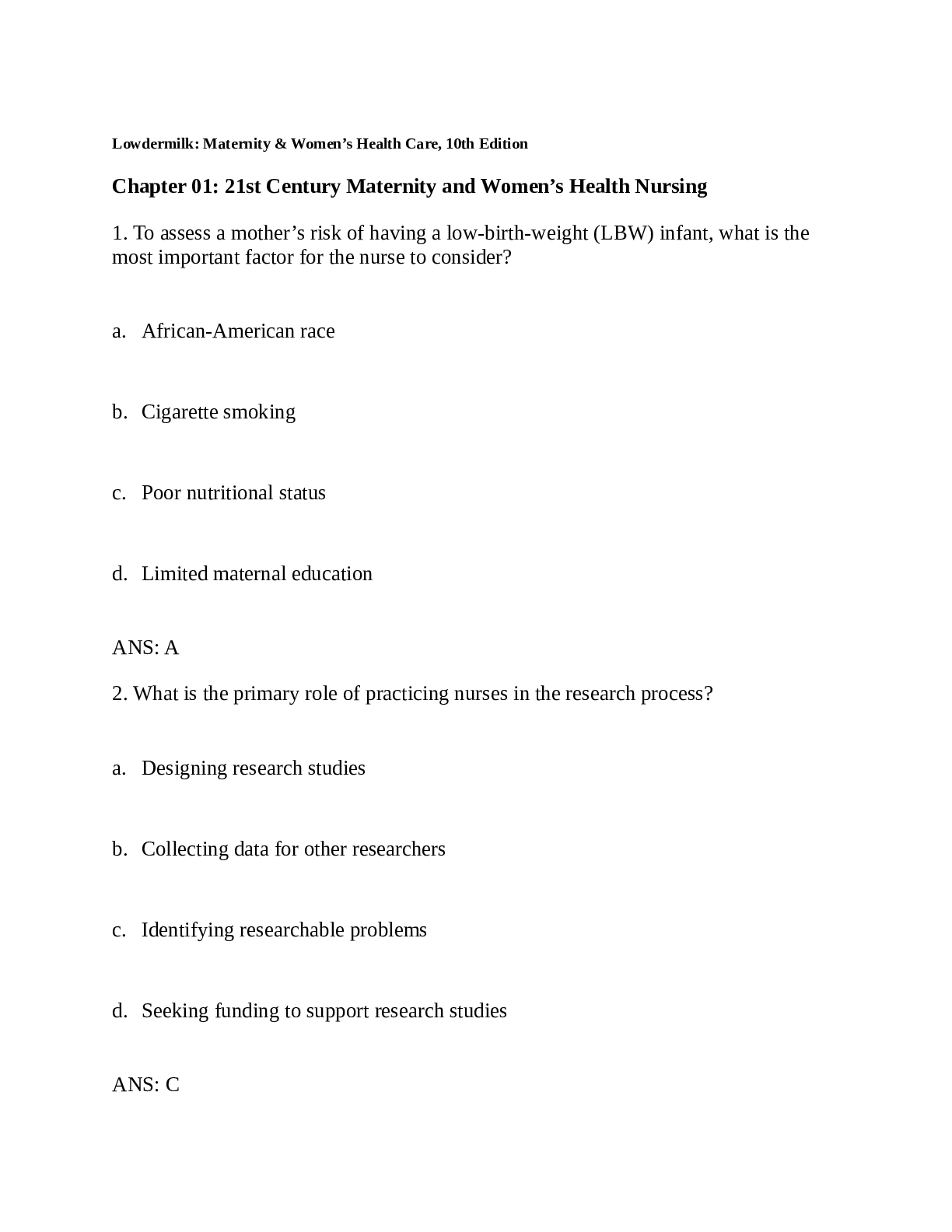*NURSING > QUESTIONS & ANSWERS > - Perspectives on Maternal, Newborn, and Women’s Health Care Maternity and Pediatric Nursing – 3 (All)
- Perspectives on Maternal, Newborn, and Women’s Health Care Maternity and Pediatric Nursing – 3,4 Edition
Document Content and Description Below
1. The United States ranks 50th in the world for maternal mortality and 41st among industrialized nations for infant mortality rate. When developing programs to assist in decreasing these rates, which... factor would most likely need to be addressed as having the greatest impact? A) Resolving all language and cultural differences B) Assuring early and adequate prenatal care C) Providing more extensive women’s shelters D) Encouraging all women to eat a balanced diet 2. When integrating the principles of family-centered care, the nurse would include which of the following? A) Childbirth is viewed as a procedural event B) Families are unable to make informed choices C) Childbirth results in changes in relationships D) Families require little information to make appropriate decisions 3. When preparing a teaching plan for a group of first-time pregnant women, the nurse expects to review how maternity care has changed over the years. Which of the following would the nurse include when discussing events of the 20th century? A) Epidemics of puerperal fever B) Performance of the first cesarean birth C) Development of the x-ray to assess pelvic size D) Creation of free-standing birth centers 4. After teaching a group of students about pregnancy-related mortality, the instructor determines that additional teaching is needed when the students identify which condition as a leading cause? A) Hemorrhage B) Embolism C) Obstructed labor D) Infection 5. The nurse is working with a group of community health members to develop a plan to address the special health needs of women. Which of the following conditions would the group address as the major problem? A) Smoking B) Heart disease C) Diabetes D) Cancer 6. When assessing a family for possible barriers to health care, the nurse would consider which factor to be most important? A) Language B) Health care workers’ attitudes C) Transportation D) Finances 7. After teaching a group of nursing students about the issue of informed consent. Which of the following, if identified by the student, would indicate an understanding of a violation of informed consent? A) Performing a procedure on a 15-year-old without consent B) Serving as a witness to the signature process C) Asking whether the client understands what she is signing D) Getting verbal consent over the phone for emergency procedures 8. The nurse is trying to get consent to care for an 11-year-old boy with diabetic ketoacidosis. His parents are out of town on vacation, and the child is staying with a neighbor. Which action would be the priority? A) Getting telephone consent with two people listening to the verbal consent B) Providing emergency care without parental consent C) Contacting the child’s aunt or uncle to obtain their consent D) Advocating for termination of parental rights for this situation 9. After teaching nursing students about the basic concepts of family-centered care, the instructor determines that the teaching was successful when the students state which of the following? A) “Childbirth affects the entire family, and relationships will change.” B) “Families are not capable of making health care decisions for themselves.” C) “Mothers are the family members affected by childbirth.” D) “Childbirth is a medical procedure.” 10. A nursing instructor is preparing a class discussion on the trends in health care and health care delivery over the past several centuries. When discussing the changes during the past century, which of the following would the instructor be least likely to include? A) Disease prevention B) Health promotion C) Wellness D) Analysis of morbidity and mortality 11. A nurse is assigned to care for an Asian American client. The nurse develops a plan of care with the understanding that based on this client’s cultural background, the client most likely views illness as which of the following? A) Caused by supernatural forces. B) A punishment for sins. C) Due to spirits or demons. D) From an imbalance of yin and yang 12. A nurse is developing a plan of care for a woman to ensure continuity of care during pregnancy, labor, and childbirth. Which of the following would be most important for the nurse to incorporate into that plan? A) Adhering to strict, specific routines B) Involving a pediatric physician C) Educating the client about the importance of a support person D) Assigning several nurses as a support team 13. A nursing instructor is preparing a class discussion on case management in maternal and newborn health care. Which of the following would the instructor include as a key component? Select all that apply. A) Advocacy B) Coordination C) Communication D) Resource management E) Event managed care 14. After teaching a group of students about the concept of maternal mortality, the instructor determines that additional teaching is needed when the students state which of the following? A) “The rate includes accidental causes for deaths.” B) “It addresses pregnancy-related causes.” C) “The duration of the pregnancy is not a concern.” D) “The time frame is typically for a specified year.” 15. A group of students are reviewing the historical aspects about childbirth. The students demonstrate understanding of the information when they identify the use of twilight sleep as a key event during which time frame? A) 1700s B) 1800s C) 1900s D) 2000s 16. A nurse is providing care to a woman who has just delivered a healthy newborn. Which action would least likely demonstrate application of the concept of family-centered care? A) Focusing on the birth as a normal healthy event for the family B) Creating opportunities for the family to make informed decisions C) Encouraging the woman to keep her other children at home D) Fostering a sense of respect for the mother and the family 17. When discussing fetal mortality with a group of students, a nurse addresses maternal factors. Which of the following would the nurse most likely include? Select all that apply. A) Chromosomal abnormalities B) Malnutrition C) Preterm cervical dilation D) Underlying disease condition E) Poor placental attachment 18. A nurse is preparing a presentation for a local community group about health status and children’s health. Which of the following would the nurse include as one of the most significant measures? A) Fetal mortality rate B) Neonatal mortality rate C) Infant mortality rate D) Maternal mortality rate 19. A group of students are reviewing an article describing information related to indicators for women’s health and the results of a national study. Which of the following would the students identify as being satisfactory for women? Select all that apply. A) Smoking cessation B) Colorectal cancer screening C) Violence against women D) Health insurance coverage E) Mammograms 20. A nurse is preparing a presentation for a local women’s group about heart disease and women. Which of the following would the nurse expect to address when discussing measures to promote health. A) Women have similar symptoms as men for a heart attack. B) Heart disease is no longer viewed as a “man’s disease.” C) Women experiencing a heart attack are at greater risk for dying. D) Heart attacks in women are more easily diagnosed. 21. A nurse is working to develop a health education program for a local community to address breast cancer awareness. Which of the following would the nurse expect to include when describing this problem to the group? Select all that apply. A) White women have higher rates of breast cancer than African American women. B) African American women are more likely to die from breast cancer at any age. C) Survival at any stage is worse among white women. D) Women living in South America have the highest rates of breast cancer. E) Breast cancer is the leading cause of cancer mortality in women. 22. A group of nursing students are reviewing information about factors affecting maternal, newborn, and women’s health. The students demonstrate understanding of the information when they identify which of the following deficiencies as being associated with poverty? Select all that apply. A) Literacy B) Employment opportunities C) Mobility D) Political representation E) Skills - Family-Centered Community-Based Care Maternity and Pediatric Nursing - Third Edition 1. The nurse is caring for a 2-week-old newborn girl with a metabolic disorder. Which of the following activities would deviate from the characteristics of family-centered care? A) Softening unpleasant information or prognoses B) Evaluating and changing the nursing plan of care C) Collaborating with the child and family as equals D) Showing respect for the family’s beliefs and wishes 2. The nurse is providing home care for a 6-year-old girl with multiple medical challenges. Which of the following activities would be considered the tertiary level of prevention? A) Arranging for a physical therapy session B) Teaching parents to administer albuterol C) Reminding parent to give a full course of antibiotics D) Giving a DTaP vaccination at the proper interval 3. A nursing student is reviewing information about documenting client care and education in the medical record and the purposes that it serves. The student demonstrates a need for additional study when the nurse identifies which of the following as a reason? A) Serves as a communication tool for the interdisciplinary team. B) Demonstrates education the family has received if legal matters arise. C) Permits others access to allow refusal of medical insurance coverage. D) Verifies meeting client education standards set by the Joint Commission. 4. A pregnant client tells her nurse that she is interested in arranging a home birth. After educating the client on the advantages and disadvantages, which statement would indicate that the client understood the information? A) “I like having the privacy, but it might be too expensive for me to set up in my home.” B) “I want to have more control, but I am concerned if an emergency would arise.” C) “It is safer because I will have a midwife.” D) “The midwife is trained to resolve any emergency, and she can bring any pain meds.” 5. The nurse is making a home visit to a client who had a cesarean birth 3 days ago. Assessment reveals that the client is complaining of intermittent pain, rating it as 8 on a scale of 1 to 10. She states, “I’m pretty tired. And with this pain, I haven’t been drinking and eating like I should. The medication helps a bit but not much. My mom has been helping with the baby.” Her incision is clean, dry, and intact. Which nursing diagnosis would the nurse identify as the priority for this client? A) Impaired skin integrity related to cesarean birth incision B) Fatigue related to effects of surgery and caretaking activities C) Imbalanced nutrition, less than body requirements related to poor fluid and food intake D) Acute pain related to incision and cesarean birth 6. When caring for childbearing families from cultures different from one’s own, which of the following must be accomplished first? A) Adapt to the practices of the family’s culture B) Determine similarities between both cultures C) Assess personal feelings about that culture D) Learn as much as possible about that culture 7. After teaching a group of students about the changes in health care delivery and funding, which of the following, if identified by the group as a current trend seen in the maternal and child health care settings, would indicate that the teaching was successful? A) Increase in community settings for care B) Decrease in family poverty level C) Increase in hospitalization of children D) Decrease in managed care 8. The nurse would recommend the use of which supplement as a primary prevention strategy to prevent neural tube defects with pregnant women? A) Calcium B) Folic acid C) Vitamin C D) Iron 9. Which action would the nurse include in a primary prevention program in the community to help reduce the incidence of HIV infection? A) Provide treatment for clients who test positive for HIV B) Monitor viral load counts periodically C) Educate clients in how to practice safe sex D) Offer testing for clients who practice unsafe sex 10. When assuming the role of discharge planner for a woman requiring ventilator support at home, the nurse would do which of the following? A) Confer with the client’s mother B) Teach new self-care skills to the client C) Determine if there is a need for back-up power D) Discuss coverage with the insurance company 11. When comparing community-based nursing with nursing in the acute care setting to a group of nursing students, the nurse describes the challenges associated with community-based nursing. Which of the following would the nurse include? A) Increased time available for education B) Improved access to resources C) Decision making in isolation D) Greater environmental structure 12. After teaching a group of students about the different levels of prevention, the instructor determines a need for additional teaching when the students identify which of the following as a secondary prevention level activity in community-based health care? A) Teaching women to take folic acid supplements to prevent neural tube defects B) Working with women who are victims of domestic violence C) Working with clients at an HIV clinic to provide nutritional and CAM therapies D) Teaching hypertensive clients to monitor blood pressure 13. A nursing instructor is describing trends in maternal and newborn health care. The instructor addresses the length of stay for vaginal births during the past decade, citing that which of the following denotes the average stay? A) 24–48 hours or less B) 72–96 hours or less C) 48–72 hours or less D) 96–120 hours or less 14. Which of the following statements is accurate regarding women’s health care in today’s system? A) Women spend 95 cents of every dollar spent on health care. B) Women make almost 90% of all health care decisions. C) Women are still the minority in the United States. D) Men use more health services than women. 15. A nurse is educating a client about a care plan. Which of the following statements would be appropriate to assess the client’s learning ability? A) “Did you graduate from high school; how many years of schooling did you have?” B) “Do you have someone in your family who would understand this information?” C) “Many people have trouble remembering information; is this a problem for you?” D) “Would you prefer that the doctor give you more detailed medical information?” 16. A nurse is developing cultural competence. Which of the following indicates that the nurse is in the process of developing cultural knowledge? Select all that apply. A) Examining personal sociocultural heritage B) Reviewing personal biases and prejudices C) Seeking resources to further understanding of other cultures D) Becoming familiar with other culturally diverse lifestyles E) Performing a competent cultural assessment F) Advocating for social justice to eliminate disparities. 17. A nurse is engaged in providing family-centered care for a woman and her family. The nurse is providing instrumental support with which activity? A) Explaining to the woman and family what to expect during the birth process. B) Assisting the woman in breathing techniques to cope with labor contractions. C) Reinforcing the woman’s role as a mother after birth D) Helping the family obtain extra financial help for prescribed phototherapy 18. A nurse is considering a change in employment from the acute care setting to community- based nursing. The nurse is focusing her job search on ambulatory care settings. Which of the following would the nurse most likely find as a possible setting? Select all that apply. A) Urgent care center B) Hospice care C) Immunization clinic D) Physician’s office E) Day surgery center F) Nursing home 19. A nursing instructor is presenting a class for a group of students about community-based nursing interventions. The instructor determines that additional teaching is needed when the students identify which of the following? A) Conducting childbirth education classes B) Counseling a pregnant teen with anemia C) Consulting with a parent of a child who is vomiting D) Performing epidemiologic investigations 20. During class, a nursing student asks, “I read an article that was talking about integrative medicine. What is that?” Which response by the instructor would be most appropriate? A) “It refers to the use of complementary and alternative medicine in place of traditional therapies for a condition.” B) “It means that complementary and alternative medicine is used together with conventional therapies to reduce pain or discomfort.” C) “It means that mainstream medical therapies and complementary and alternative therapies are combined based on scientific evidence for being effective.” D) “It refers to situations when a client and his or her family prefer to use an unproven method of treatment over a proven one.” 21. While a nurse is obtaining a health history, the client tells the nurse that she practices aromatherapy. The nurse interprets this as which of the following? A) Use of essential oils to stimulate the sense of smell to balance the mind and body B) Application of pressure to specific points to allow self-healing C) Use of deep massage of areas on the foot or hand to rebalance body parts D) Participation in chanting and praying to promote healing. 22. A pregnant woman asks the nurse about giving birth in a birthing center. She says, “I’m thinking about using one but I’m not sure.” Which of the following would the nurse need to integrate into the explanation about this birth setting? (Select all that apply.) A) An alternative for women who are uncomfortable with a home birth. B) The longer length of stay needed when compared to hospital births C) Focus on supporting women through labor instead of managing labor D) View of labor and birth as a normal process requiring no intervention E) Care provided primarily by obstetricians with midwives as backup care 23. A nurse practicing in the community is preparing a presentation for a group of nursing students about this practice setting. Which of the following would the nurse include as characteristic of this role? A) Greater emphasis on direct physical care B) Broader assessment to include the environment C) Increased dependency on physician D) Limited decision making and support 24. A nurse is preparing a teaching plan for a woman who is pregnant for the first time. Which of the following would the nurse incorporate into the teaching plan to foster the client’s learning? (Select all that apply.) A) Teach “survival skills” first B) Use simple, nonmedical language C) Refrain from using a hands-on approach D) Avoid repeating information E) Use visual materials such as photos and videos 25. A group of nurses are reviewing the steps for developing cultural competence. The students demonstrate understanding when they identify which of the following as the final step? A) Cultural knowledge B) Cultural skills C) Cultural encounter D) Cultural awareness Anatomy and Physiology of the Reproductive System Maternity and Pediatric Nursing - Third Edition 1. When describing the menstrual cycle to a group of young women, the nurse explains that estrogen levels are highest during which phase of the endometrial cycle? A) Menstrual B) Proliferative C) Secretory D) Ischemic 2. After teaching a group of adolescent girls about female reproductive development, the nurse determines that teaching was successful when the girls state that menarche is defined as a woman’s first: A) Sexual experience B) Full hormonal cycle C) Menstrual period D) Sign of breast development 3. A client with a 28-day cycle reports that she ovulated on May 10. The nurse would expect the client’s next menses to begin on: A) May 24 B) May 26 C) May 30 D) June 1 4. Which female reproductive tract structure would the nurse describe to a group of young women as containing rugae that enable it to dilate during labor and birth? A) Cervix B) Fallopian tube C) Vagina D) Vulva 5. After teaching a group of pregnant women about breast-feeding, the nurse determines that the teaching was successful when the group identifies which hormone as important for the production of breast milk after childbirth? A) Placental estrogen B) Progesterone C) Gonadotropin-releasing hormone D) Prolactin 6. The nurse is assessing a 13-year-old girl who has had her first menses. Which of the following events would the nurse expect to have occurred first? A) Evidence of pubic hair B) Development of breast buds C) Onset of menses D) Growth spurt 7. When describing the ovarian cycle to a group of students, which phase would the instructor include? A) Luteal phase B) Proliferative phase C) Menstrual phase D) Secretory phase 8. The nurse is explaining the events that lead up to ovulation. Which hormone would the nurse identify as being primarily responsible for ovulation? A) Estrogen B) Progesterone C) Follicle-stimulating hormone D) Luteinizing hormone 9. The nurse is teaching a health education class on male reproductive anatomy and asks the students to identify the site of sperm production. Which structure, if identified by the group, would indicate to the nurse that the teaching was successful? A) Testes B) Seminal vesicles C) Scrotum D) Prostate gland 10. The nurse is creating a diagram that illustrates the components of the male reproductive system. Which structure would be inappropriate for the nurse to include as an accessory gland? A) Seminal vesicles B) Prostate gland C) Cowper’s glands D) Vas deferens 11. The nurse is preparing an outline for a class on the physiology of the male sexual response. Which event would the nurse identify as occurring first? A) Sperm emission B) Penile vasodilation C) Psychological release D) Ejaculation 12. A woman comes to the clinic complaining that she has little sexual desire. As part of the client’s evaluation, the nurse would anticipate the need to evaluate which hormone level? A) Progesterone B) Estrogen C) Gonadotropin-releasing hormone D) Testosterone 13. A nurse is conducting a class for a group of teenage girls about female reproductive anatomy and physiology. Which of the following would the nurse include as an external female reproductive organ? Select all that apply. A) Mons pubis B) Labia C) Vagina D) Clitoris E) Uterus 14. When describing the hormones involved in the menstrual cycle, a nurse identifies which hormone as responsible for initiating the cycle? A) Estrogen B) Luteinizing hormone C) Progesterone D) Prolactin 15. A nursing instructor is describing the hormones involved in the menstrual cycle to a group of nursing students. The instructor determines the teaching was successful when the students identify follicle-stimulating hormone as being secreted by which of the following? A) Hypothalamus B) Anterior pituitary gland C) Ovaries D) Corpus luteum 16. A woman comes to the clinic for an evaluation. During the visit, the woman tells the nurse that her menstrual cycles have become irregular. “I’ve also been waking up at night feeling really hot and sweating. The nurse interprets these findings as which of the following? A) Menopause B) Perimenopause C) Climacteric D) Menarche 17. After teaching a group of students about female reproductive anatomy, the instructor determines that the teaching was successful when the students identify which of the following as the site of fertilization? A) Vagina B) Uterus C) Fallopian tubes D) Vestibule 18. A woman comes to the clinic complaining of a vaginal discharge. The nurse suspects that the client has an infection. When gathering additional information, which of the following would the nurse be least likely to identify as placing the client at risk for an infection? A) Recent antibiotic therapy for an upper respiratory infection B) Last menstrual period about 5 days ago. C) Weekly douching D) Frequent use of feminine hygiene sprays. 19. A group of nursing students are reviewing information about the male reproductive structures. The students demonstrate understanding of the information when they identify which of the following as accessory organs? (Select all that apply.) A) Testes B) Vas deferens C) Bulbourethral glands D) Prostate gland E) Penis 20. A nurse is examining a female client and tests the client’s vaginal pH. Which finding would the nurse interpret as normal? A) 4.5 B) 7 C) 8.5 D) 10 21. When describing the male sexual response to a group of students, the instructor determines that the teaching was successful when they identify emission as which of the following? A) Semen forced through the urethra to the outside B) Movement of sperm from the testes and fluid into the urethras C) Dilation of the penile arteries with increased blood flow to the tissues. D) Body’s return to the physiologic nonstimulated state 22. A nurse is describing the structure and function of the reproductive system to an adolescent health class. The nurse describes the secretion of the seminal vesicles as which of the following? A) Mucus-like B) Alkaline C) Acidic D) Semen Common Reproductive Issues Maternity and Pediatric Nursing - Third Edition 1. After discussing various methods of contraception with a client and her partner, the nurse determines that the teaching was successful when they identify which contraceptive method as providing protection against sexually transmitted infections (STIs)? A) Oral contraceptives B) Tubal ligation C) Condoms D) Intrauterine system 2. When discussing contraceptive options, which method would the nurse recommend as being the most reliable? A) Coitus interruptus B) Lactational amenorrheal method (LAM) C) Natural family planning D) Intrauterine system 3. A client comes to the clinic with abdominal pain. Based on her history the nurse suspects endometriosis. The nurse expects to prepare the client for which of the following to confirm this suspicion? A) Pelvic examination B) Transvaginal ultrasound C) Laparoscopy D) Hysterosalpingogram 4. A client is to receive an implantable contraceptive. The nurse describes this contraceptive as containing: A) Synthetic progestin B) Combined estrogen and progestin C) Concentrated spermicide D) Concentrated estrogen 5. The nurse discusses various contraceptive methods with a client and her partner. Which method would the nurse explain as being available only with a prescription? A) Condom B) Spermicide C) Diaphragm D) Basal body temperature 6. When developing a teaching plan for a couple considering contraception options, which of the following statements would the nurse include? A) “You should select one that is considered to be 100% effective.” B) “The best one is the one that is the least expensive and most convenient.” C) “A good contraceptive doesn’t require a physician’s prescription.” D) “The best contraceptive is one that you will use correctly and consistently.” 7. Which of the following measures would the nurse include in the teaching plan for a woman to reduce the risk of osteoporosis after menopause? A) Taking vitamin supplements B) Eating high-fiber, high-calorie foods C) Restricting fluid to 1,000 mL daily D) Participating in regular daily exercise 8. When teaching a group of postmenopausal women about hot flashes and night sweats, the nurse would address which of the following as the primary cause? A) Poor dietary intake B) Estrogen deficiency C) Active lifestyle D) Changes in vaginal pH 9. A client states that she is to have a test to measure bone mass to help diagnose osteoporosis. The nurse would most likely plan to prepare the client for: A) DEXA scan B) Ultrasound C) MRI D) Pelvic x-ray 10. The nurse is reviewing the medical records of several clients. Which client would the nurse expect to have an increased risk for developing osteoporosis? A) A woman of African American descent B) A woman who plays tennis twice a week C) A thin woman with small bones D) A woman who drinks one cup of coffee a day 11. Which of the following would the nurse emphasize when teaching postmenopausal women about ways to reduce the risk of osteoporosis? A) Swimming daily B) Taking vitamin A C) Following a low-fat diet D) Taking calcium supplements 12. Which finding would the nurse expect to find in a client with endometriosis? A) Hot flashes B) Dysuria C) Fluid retention D) Fever 13. After the nurse teaches a client about ways to reduce the symptoms of premenstrual syndrome, which client statement indicates a need for additional teaching? A) “I will make sure to take my estrogen supplements a week before my period.” B) “I’ve signed up for an aerobic exercise class three times a week.” C) “I’ll cut down on the amount of coffee and colas I drink.” D) “I quit smoking about a month ago, so that should help.” 14. A woman has opted to use the basal body temperature method for contraception. The nurse instructs the client that a rise in basal body temperature indicates which of the following? A) Onset of menses B) Ovulation C) Pregnancy D) Safe period for intercourse 15. A woman using the cervical mucus ovulation method of fertility awareness reports that her cervical mucus looks like egg whites. The nurse interprets this as which of the following? A) Spinnbarkeit mucus B) Purulent mucus C) Postovulatory mucus D) Normal preovulation mucus 16. The nurse is reviewing the laboratory test results of a client with dysfunctional uterine bleeding (DUB). Which finding would be of concern? A) Negative pregnancy test B) Hemoglobin level of 10.1 g/dL C) Prothrombin time of 60 seconds D) Serum cholesterol of 140 mg/dL 17. A nurse is preparing a class for a group of women at a family planning clinic about contraceptives. When describing the health benefits of oral contraceptives, which of the following would the nurse most likely include? (Select all that apply.) A) Protection against pelvic inflammatory disease B) Reduced risk for endometrial cancer C) Decreased risk for depression D) Reduced risk for migraine headaches E) Improvement in acne 18. After teaching a group of students about the different methods for contraception, the instructor determines that the teaching was successful when the students identify which of the following as a mechanical barrier method? (Select all that apply.) A) Condom B) Cervical cap C) Cervical sponge D) Diaphragm E) Vaginal ring 19. After assessing a woman who has come to the clinic, the nurse suspects that the woman is experiencing dysfunctional uterine bleeding. Which statement by the client would support the nurse’s suspicions? A) “I’ve been having bleeding off and on that’s irregular and sometimes heavy.” B) “I get sharp pain in my lower abdomen usually starting soon after my period comes.” C) “I get really irritable and moody about a week before my period.” D) “My periods have been unusually long and heavy lately.” 20. After teaching a group of students about premenstrual syndrome, the instructor determines that additional teaching is needed when the students identify which of the following as a prominent assessment finding? A) Bloating B) Tension C) Dysphoria D) Weight loss 21. A nurse is describing the criteria needed for the diagnosis of premenstrual dysphoric disorder (PMDD). Which of the following would the nurse include as a mandatory requirement for the diagnosis? A) Appetite changes B) Sleep difficulties C) Persistent anger D) Chronic fatigue 22. When reviewing the medical record of a client diagnosed with endometriosis, which of the following would the nurse identify as a risk factor for this woman? A) Low fat in the diet B) Age of 14 years for menarche C) Menstrual cycles of 24 days D) Short menstrual flow 23. A client who has come to the clinic is diagnosed with endometriosis. Which of the following would the nurse expect the physician to prescribe as a first-line treatment? A) Progestins B) Antiestrogens C) Gonadotropin-releasing hormone analogues D) NSAIDs 24. A woman comes to the clinic because she has been unable to conceive. When reviewing the woman’s history, which of the following would the nurse least likely identify as a possible risk factor? A) Age of 25 years B) History of smoking C) Diabetes since age 15 years D) Weight below standard for height and age 25. A couple comes to the clinic for a fertility evaluation. The male partner is to undergo a semen analysis. After teaching the partner about this test, which client statement indicates that the client has understood the instructions? A) “I need to bring the specimen to the lab the day after collecting it.” B) “I will place the specimen in a special plastic bag to transport it.” C) “I have to abstain from sexual activity for about 1–2 days before the sample.” D) “I will withdraw before I ejaculate during sex to collect the specimen.” 26. A nurse is preparing a class for a group of young adult women about emergency contraceptives (ECs). Which of the following would the nurse need to stress to the group. Select all that apply. A) ECs induce an abortion like reaction. B) ECs provide some protection against STIs C) ECs are birth control pills in higher, more frequent doses D) ECs are not to be used in place of regular birth control E) ECs provide little protection for future pregnancies. .................ALL CHAPTERS ARE ATTACHED IN THIS DOCUMENT + THE ANSWER KEY [Show More]
Last updated: 1 year ago
Preview 1 out of 347 pages
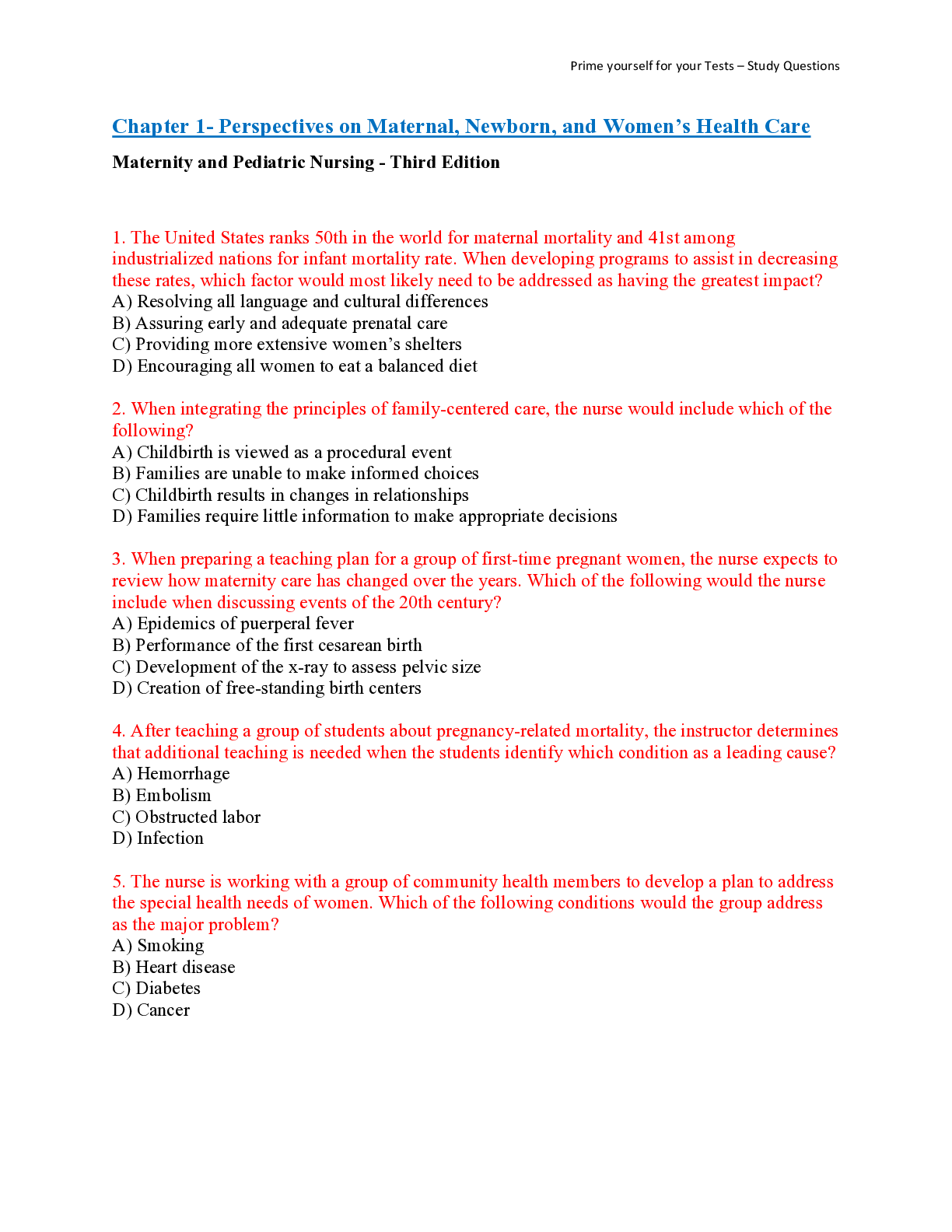
Reviews( 0 )
Document information
Connected school, study & course
About the document
Uploaded On
Sep 10, 2021
Number of pages
347
Written in
Additional information
This document has been written for:
Uploaded
Sep 10, 2021
Downloads
0
Views
38

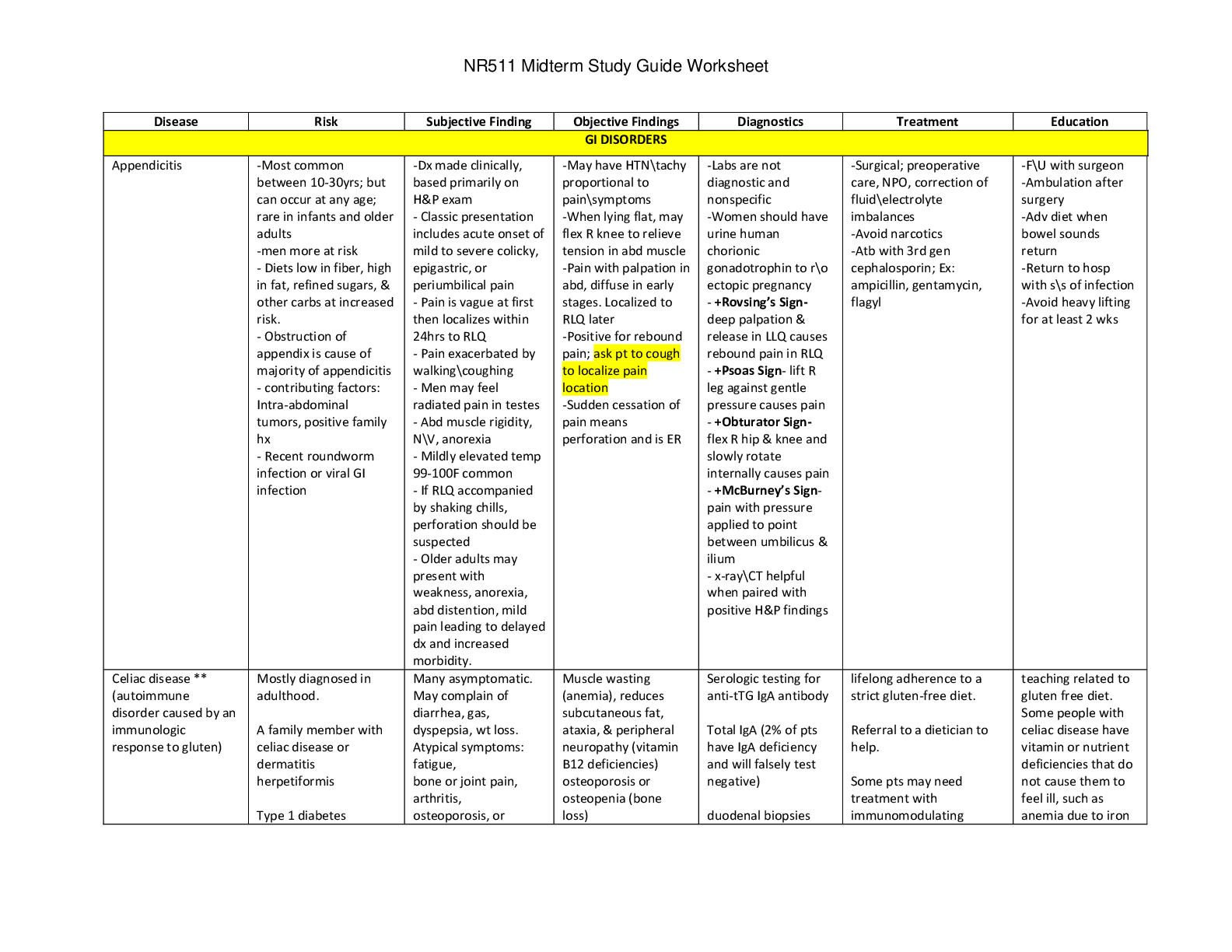
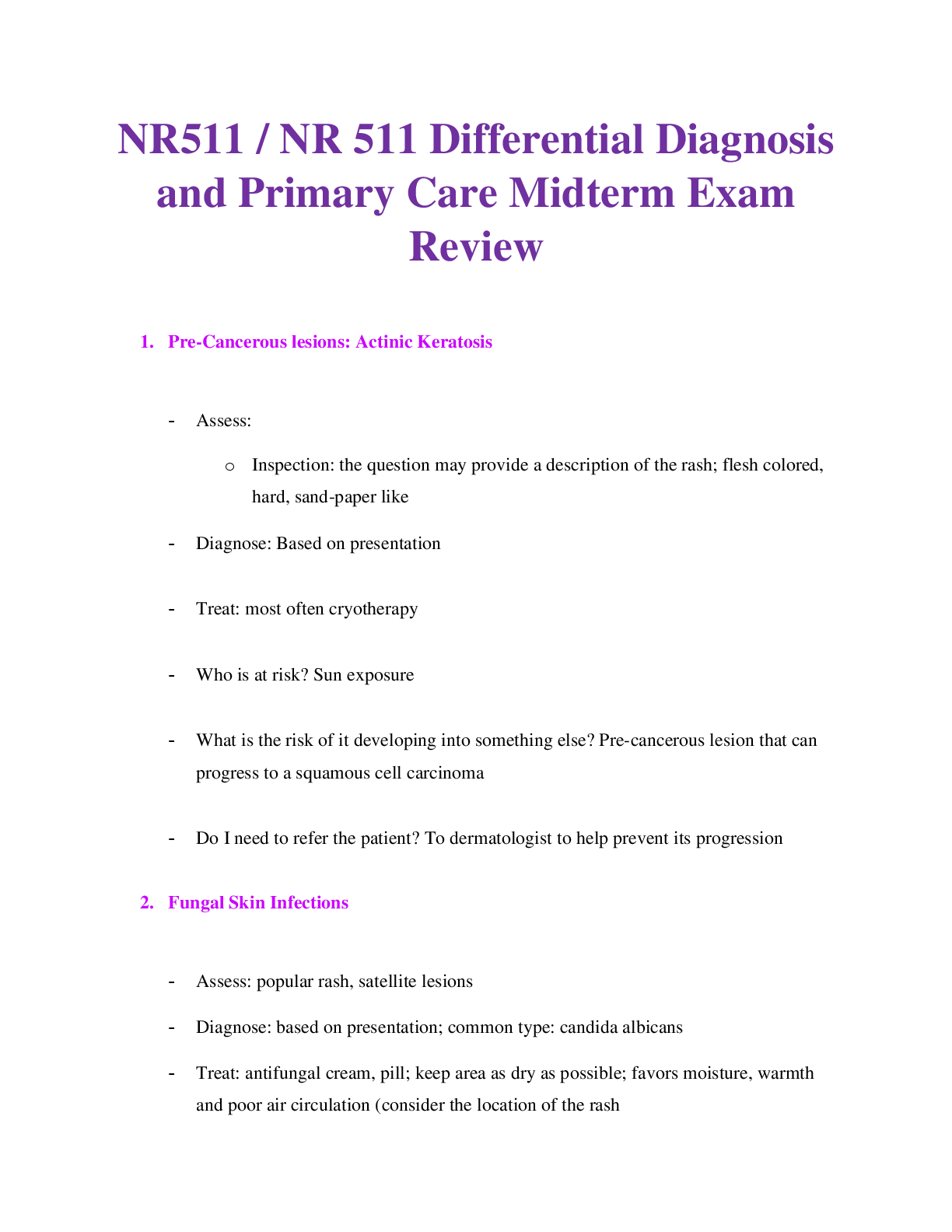
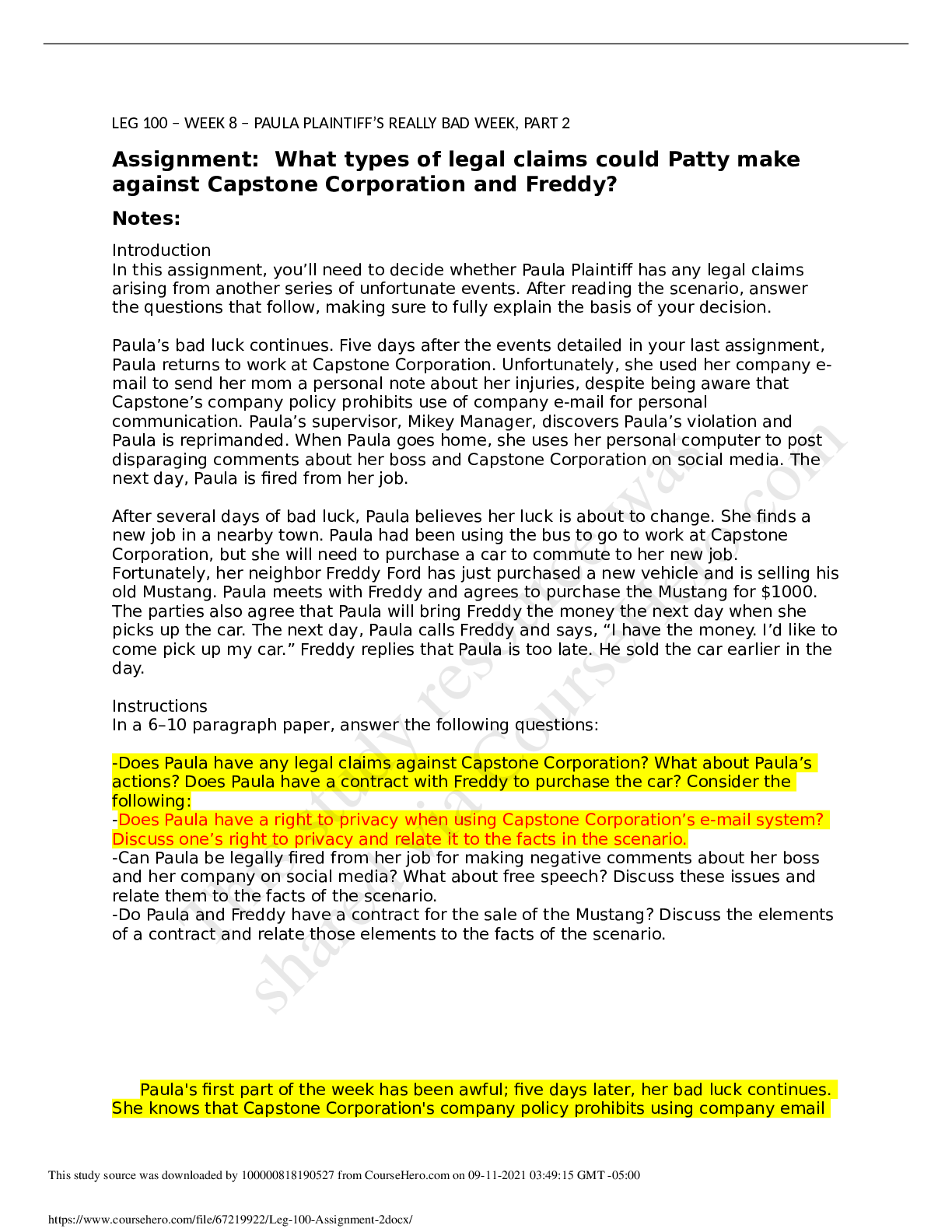
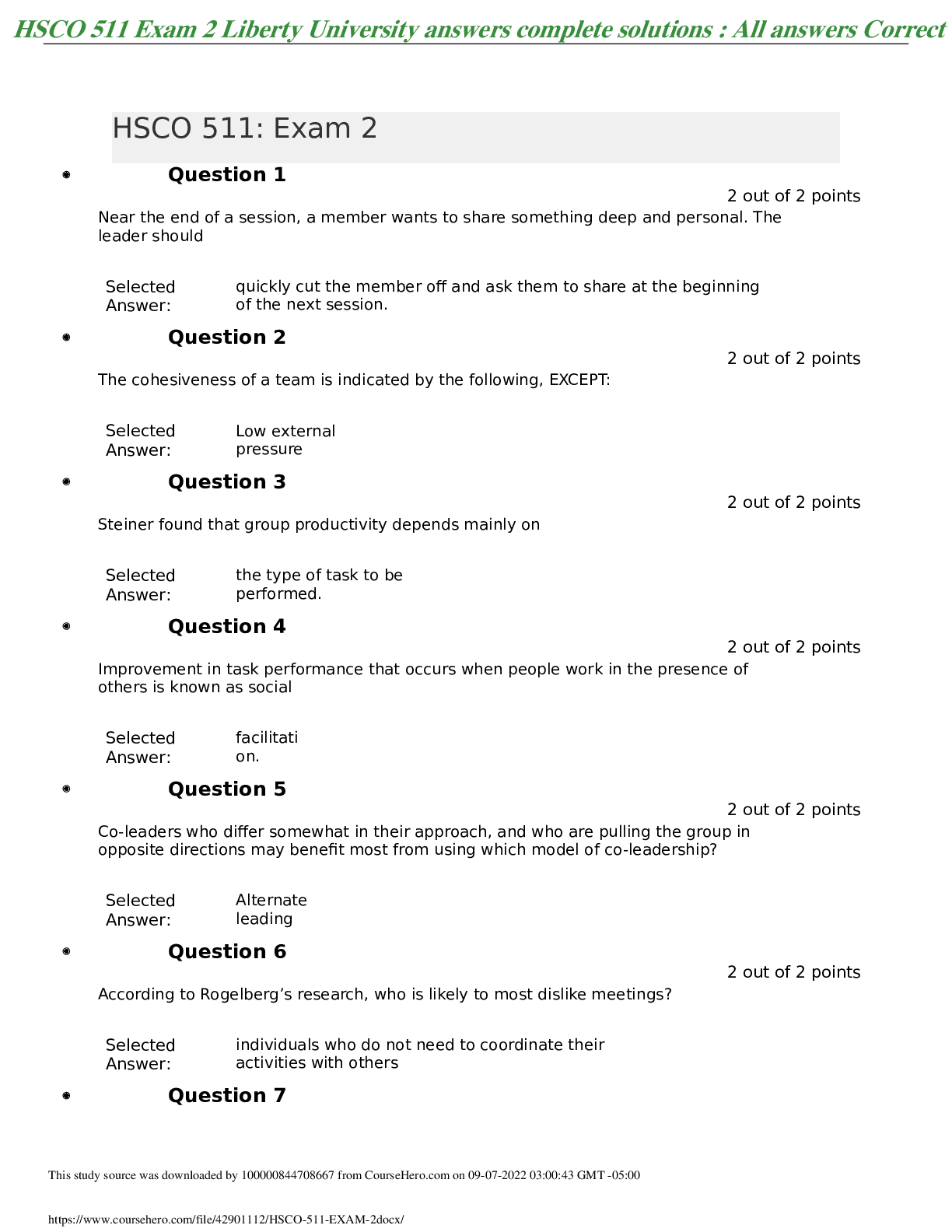
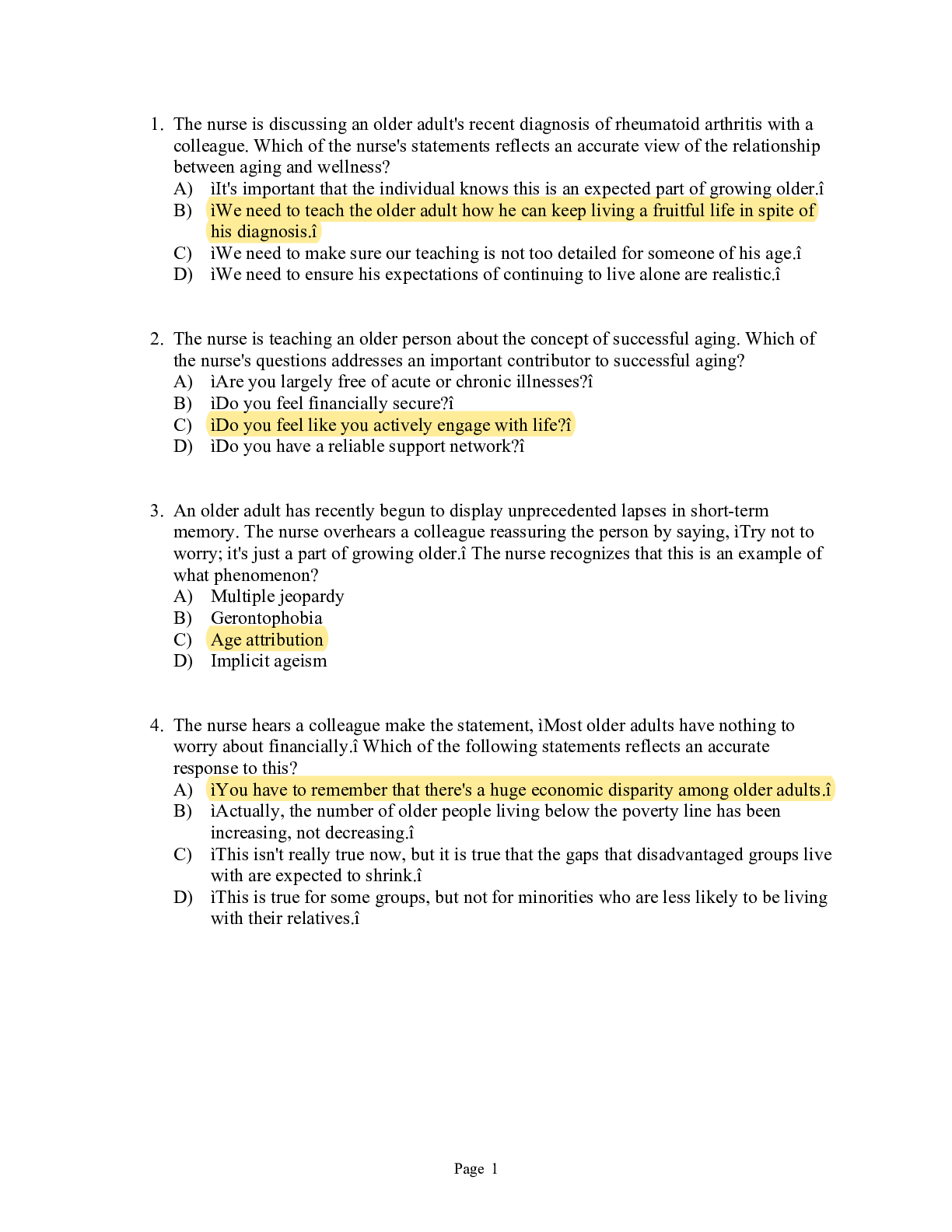
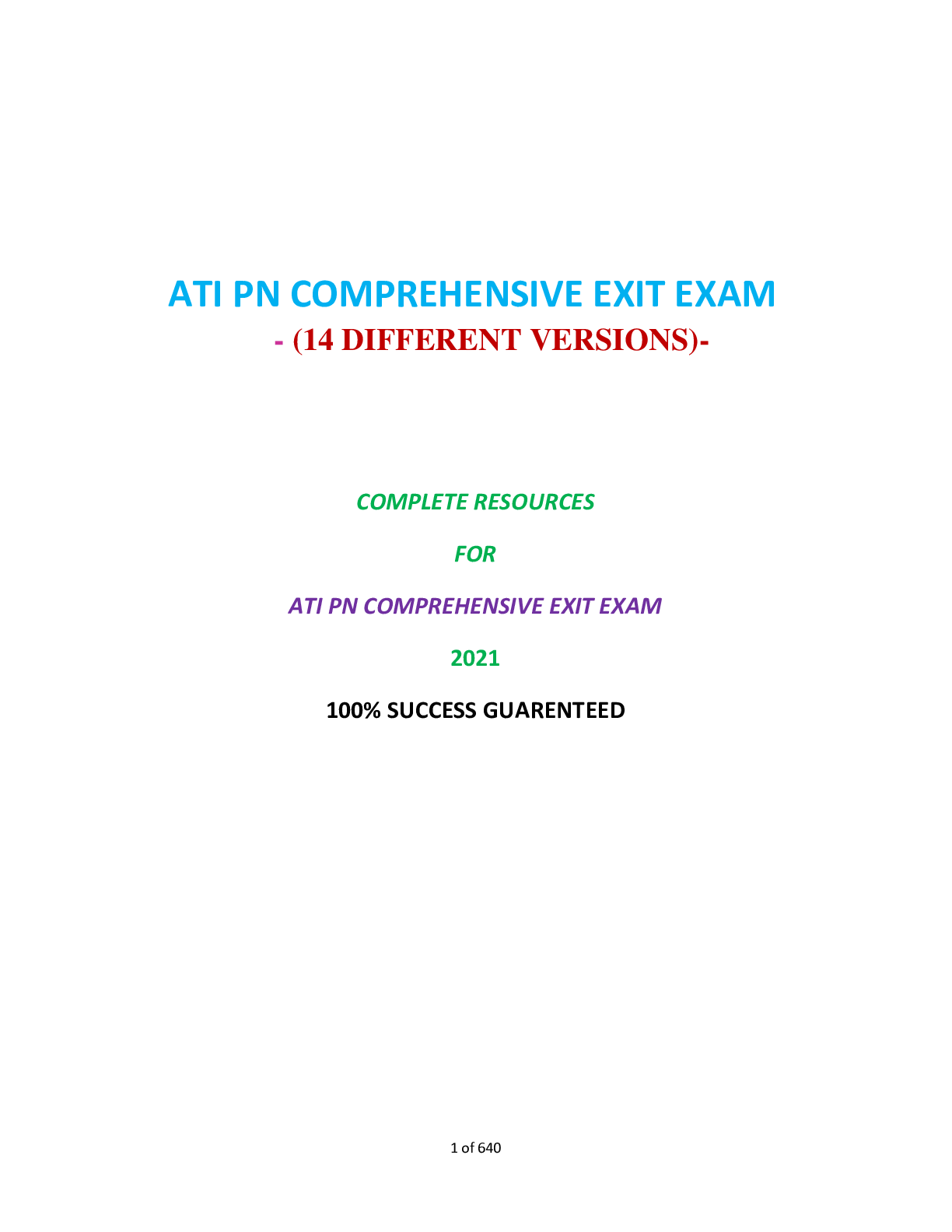
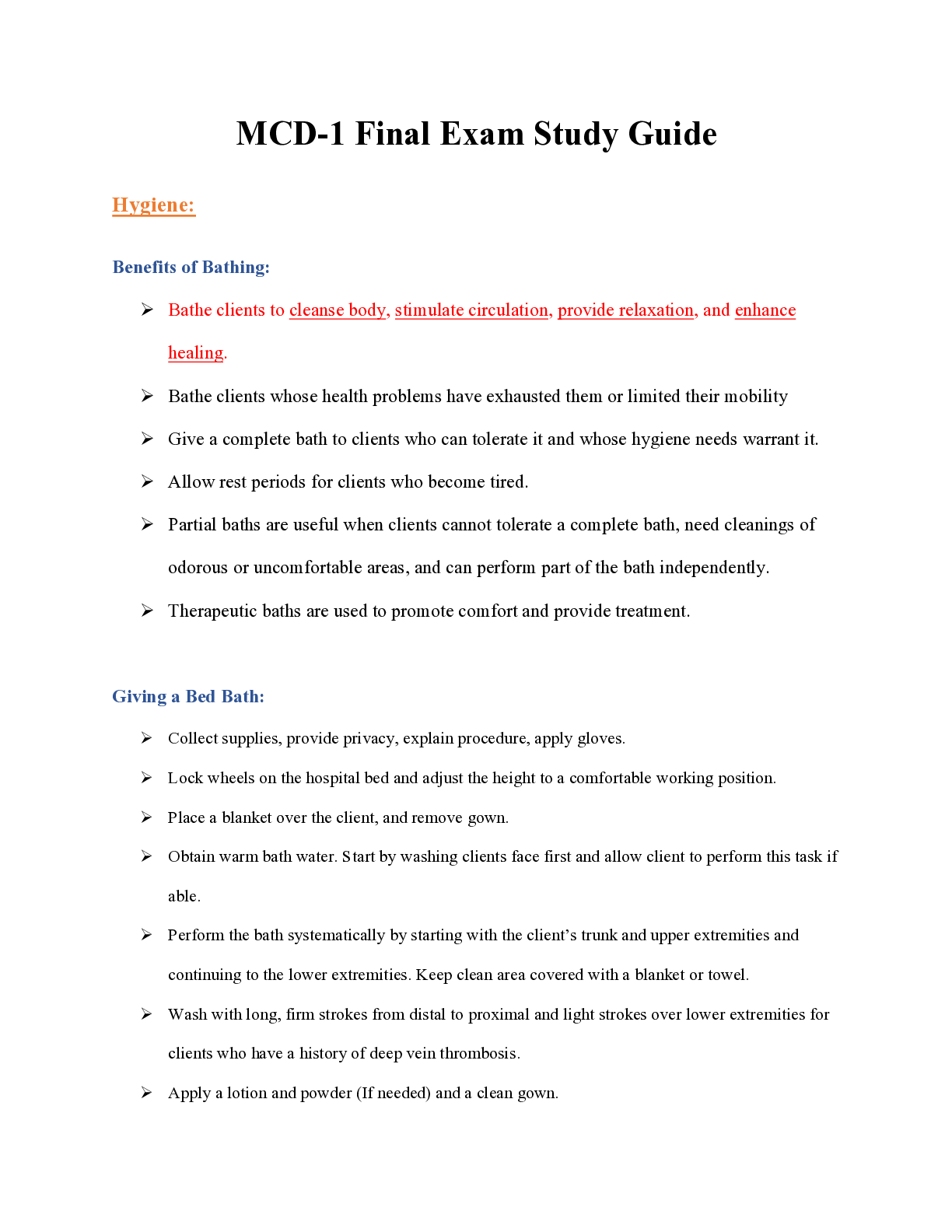
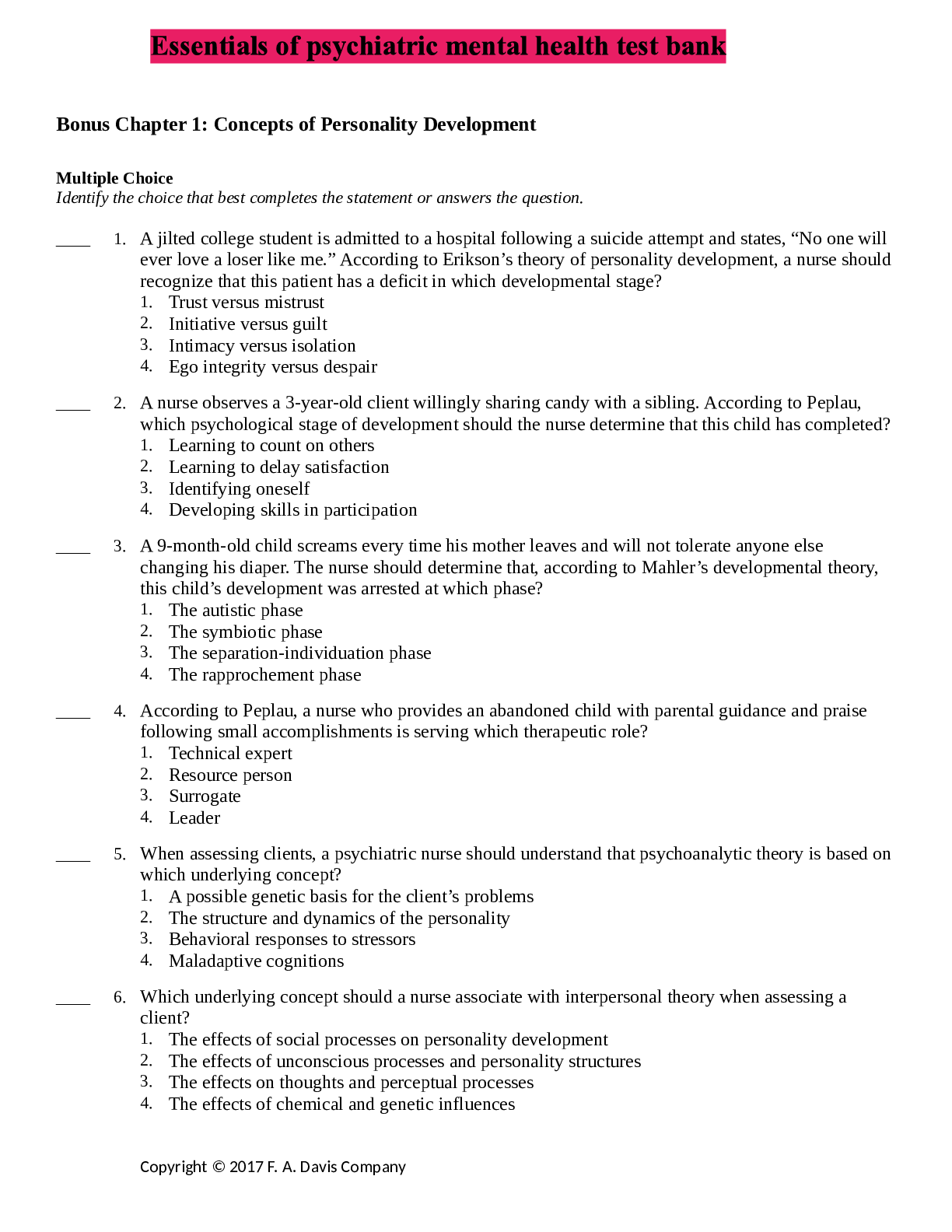
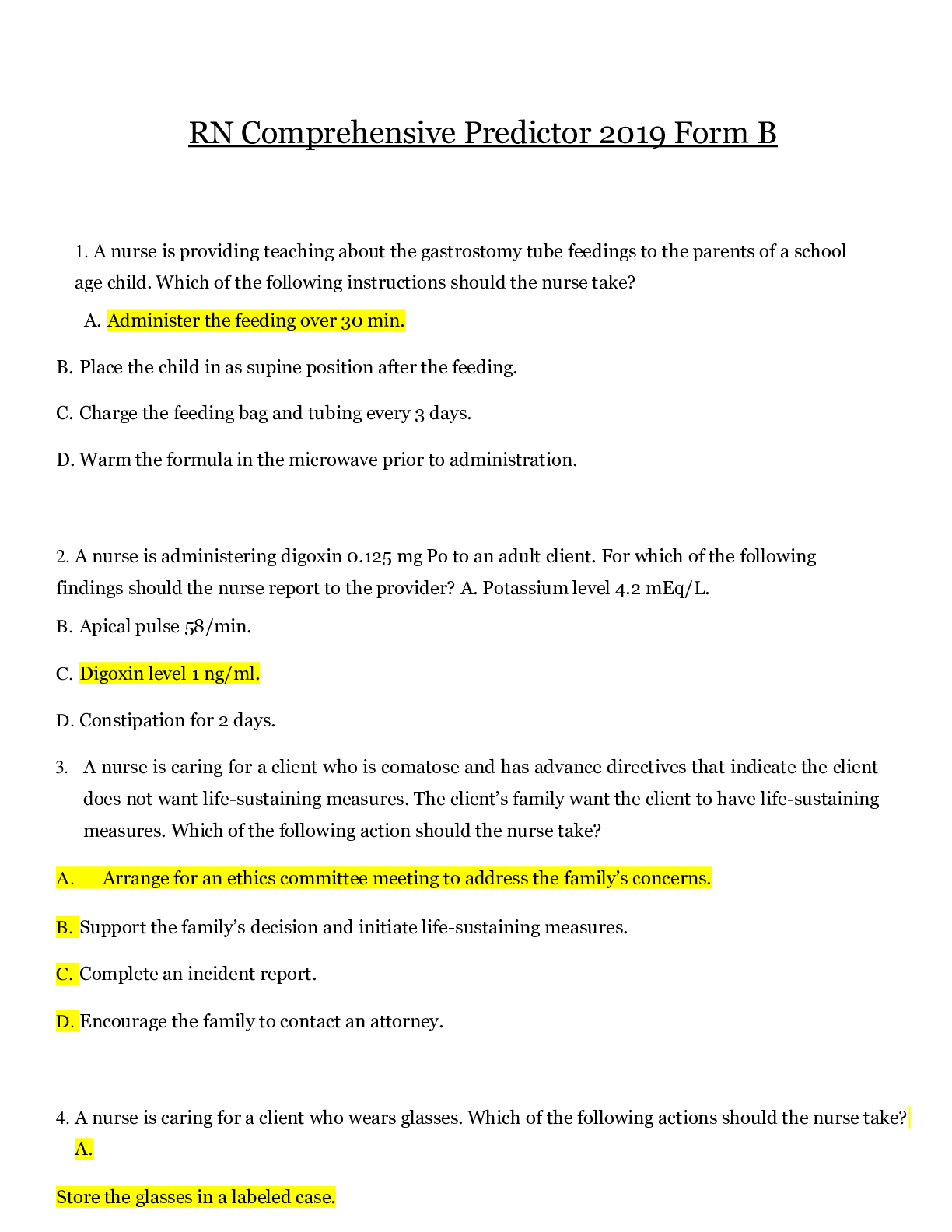

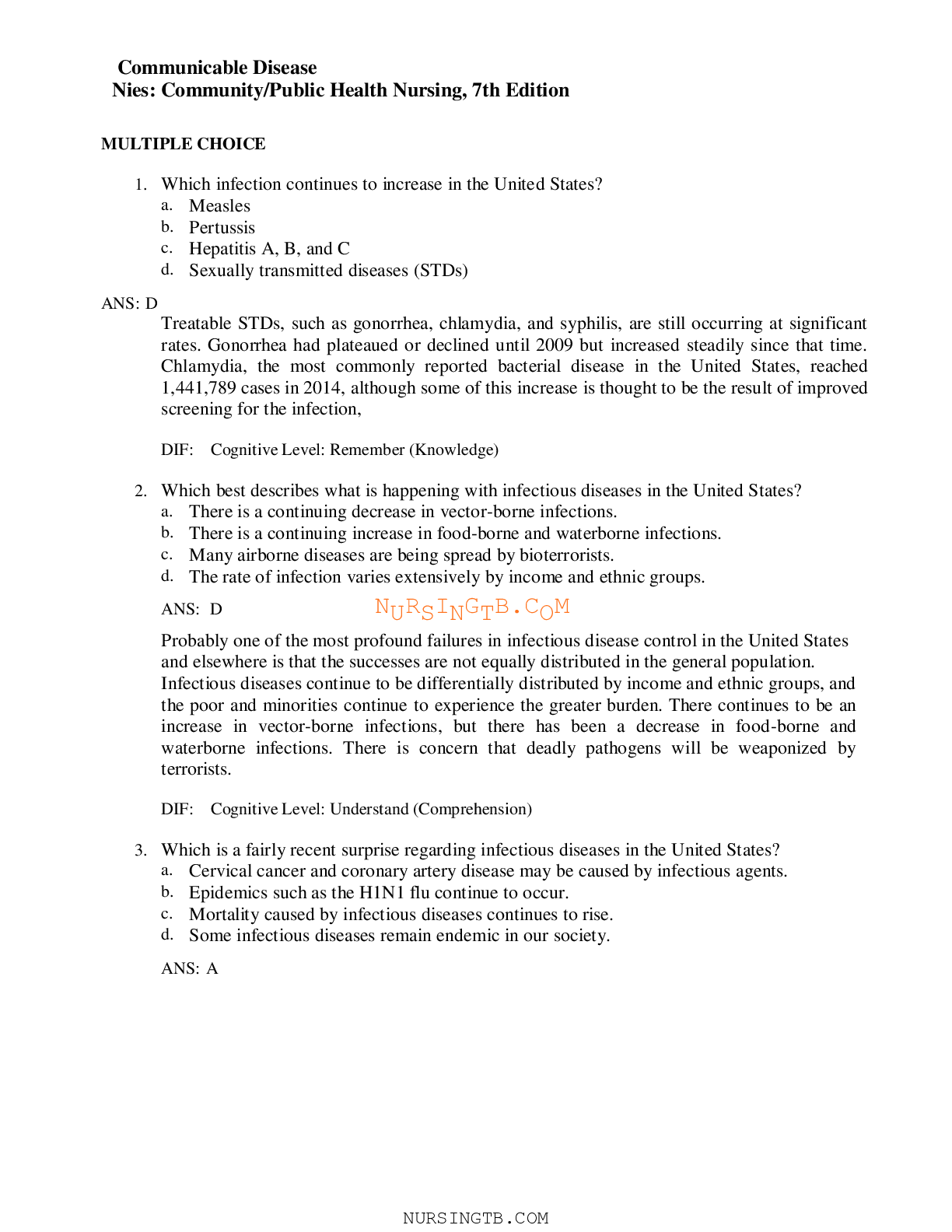

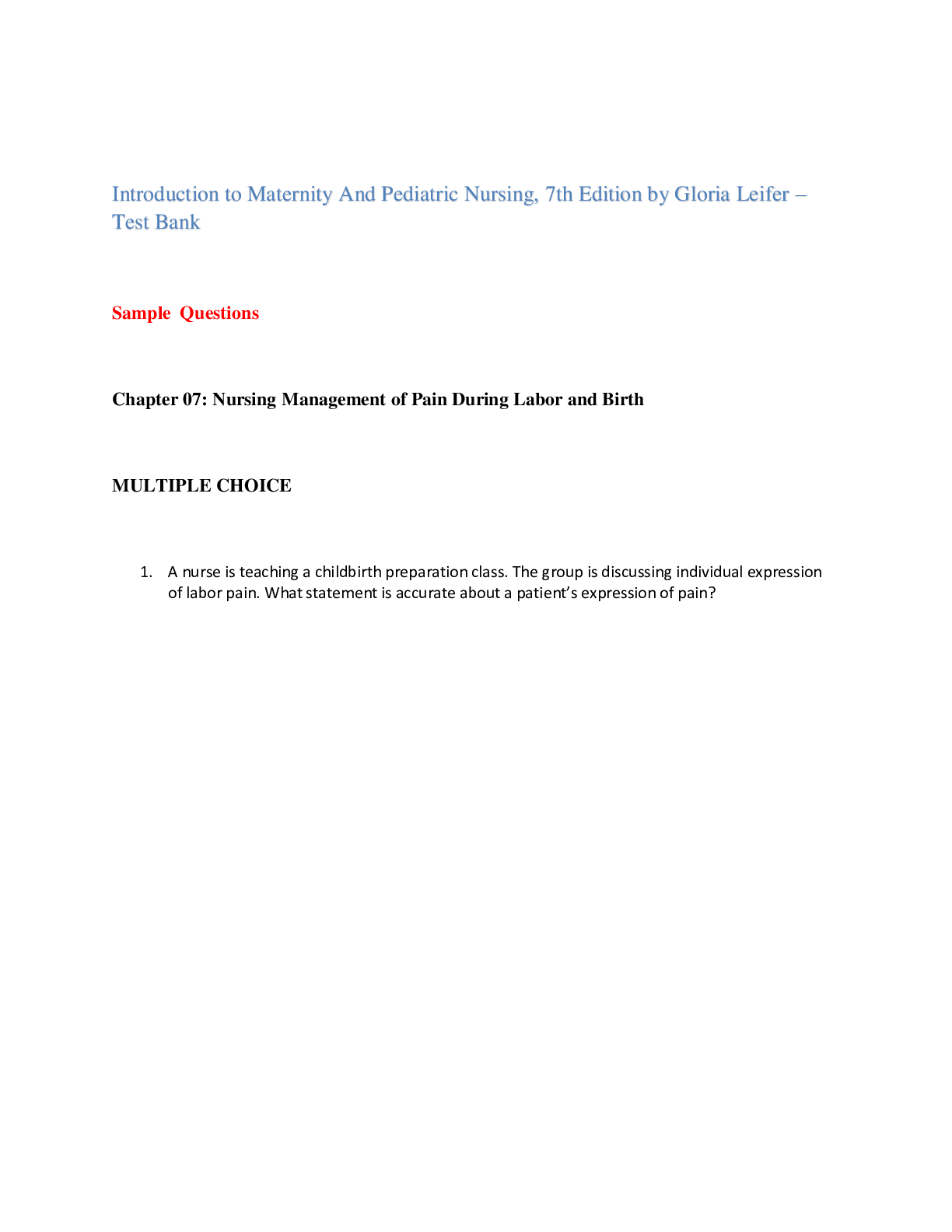
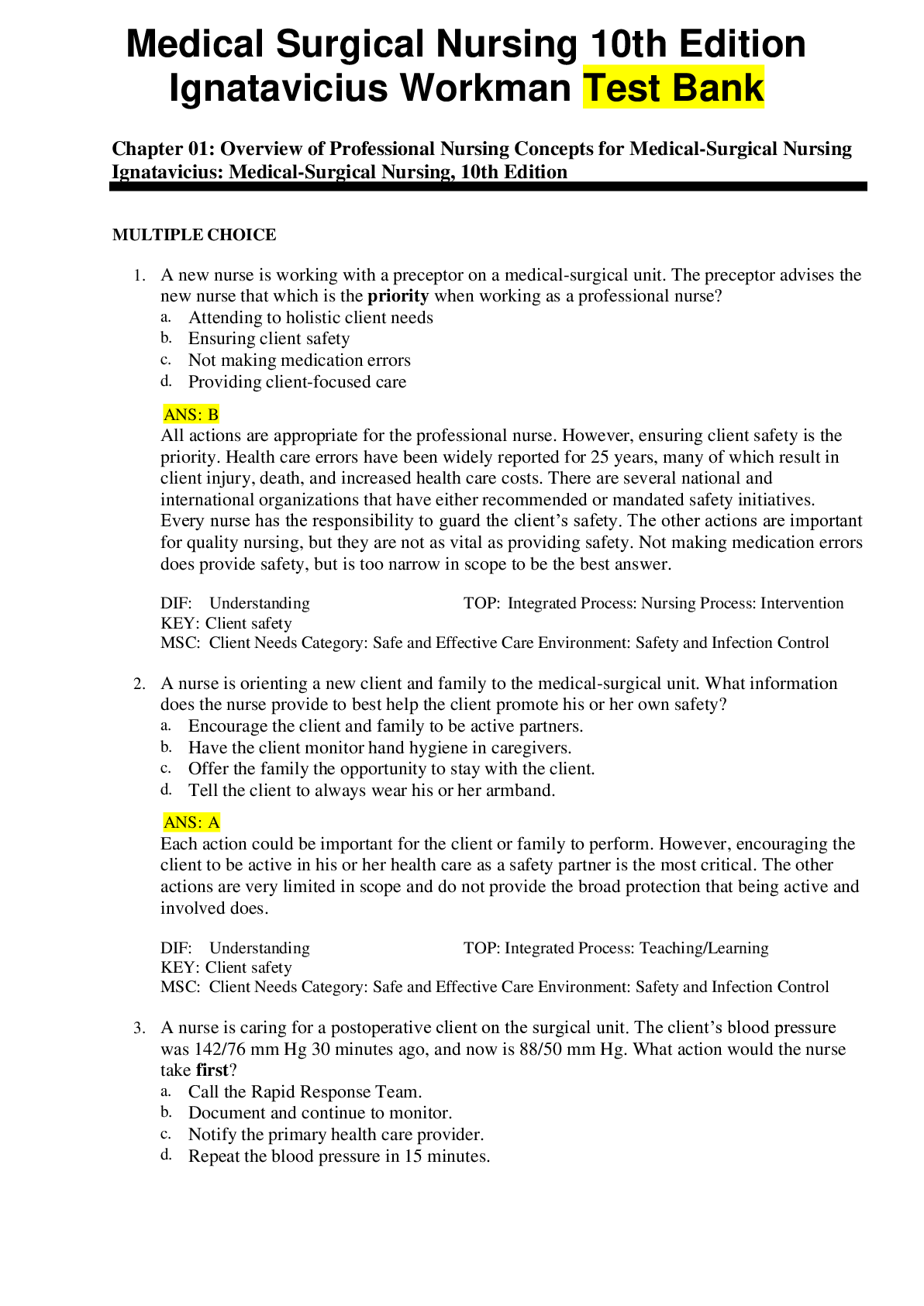
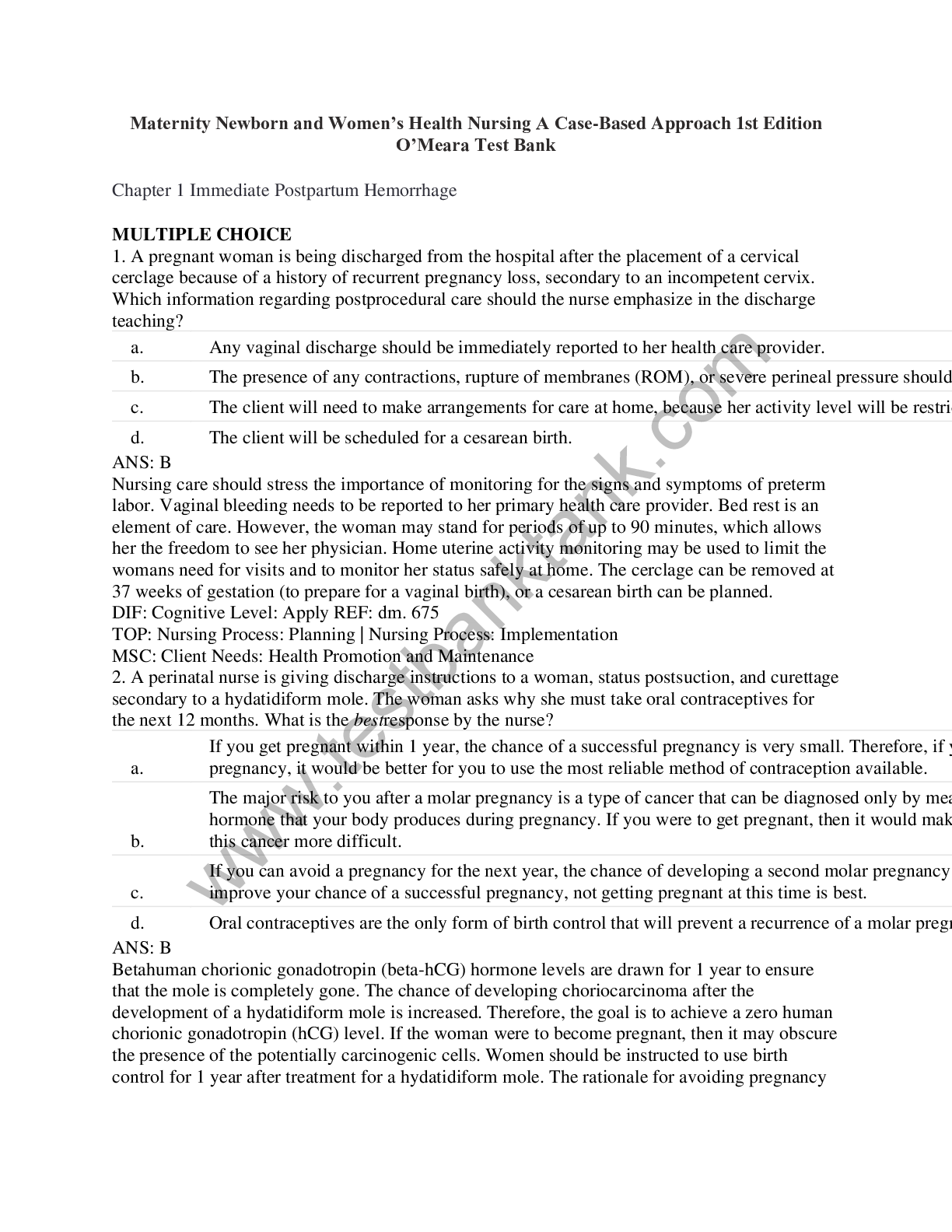
.png)
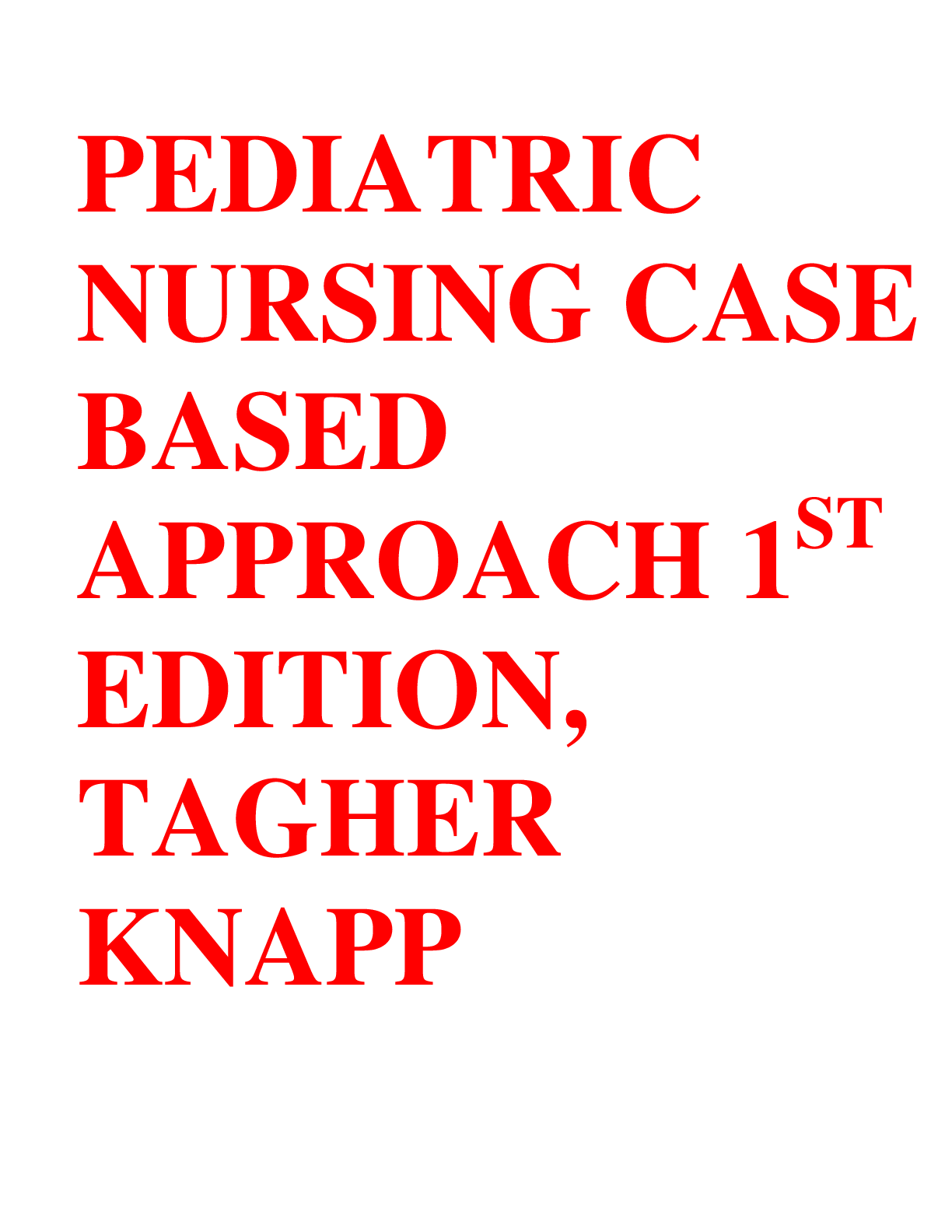
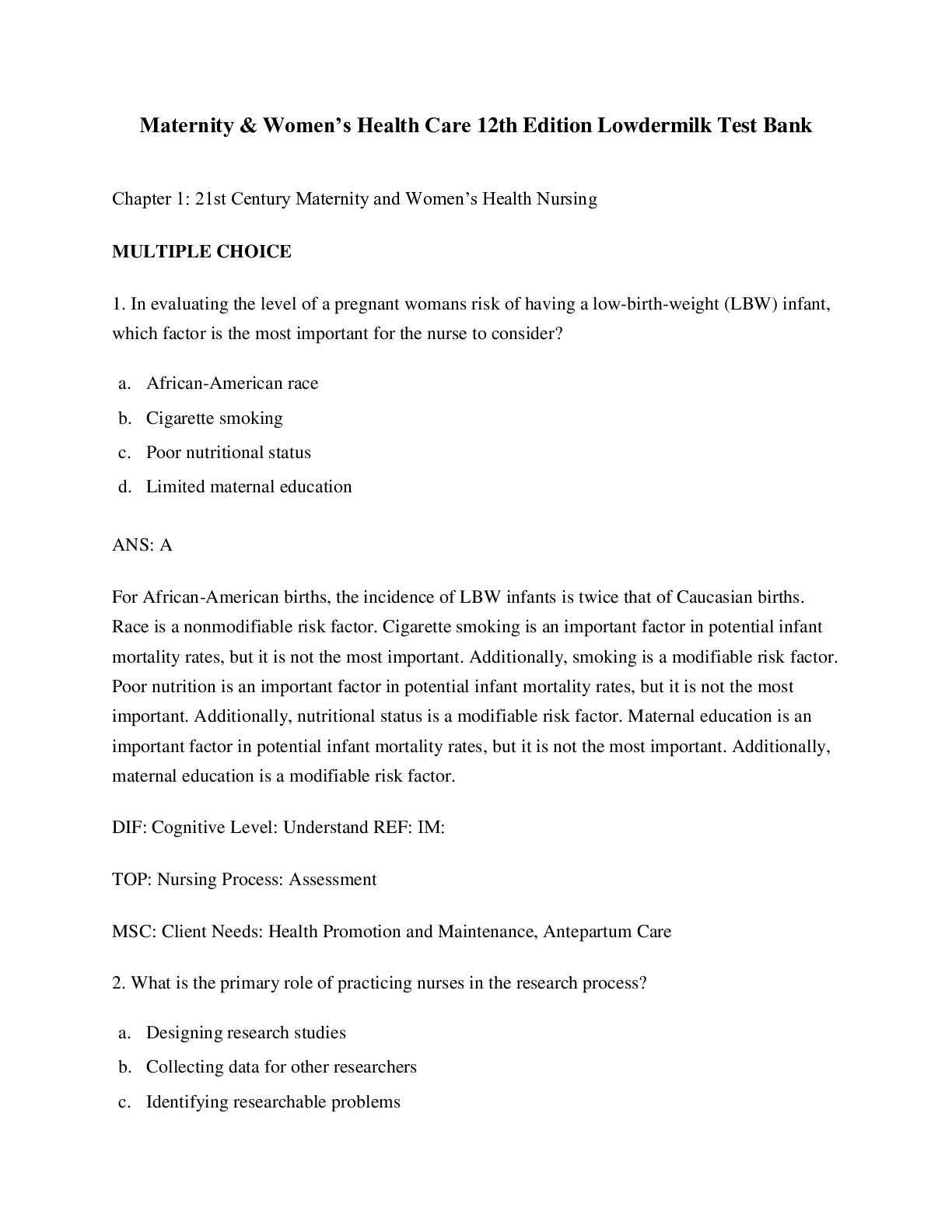
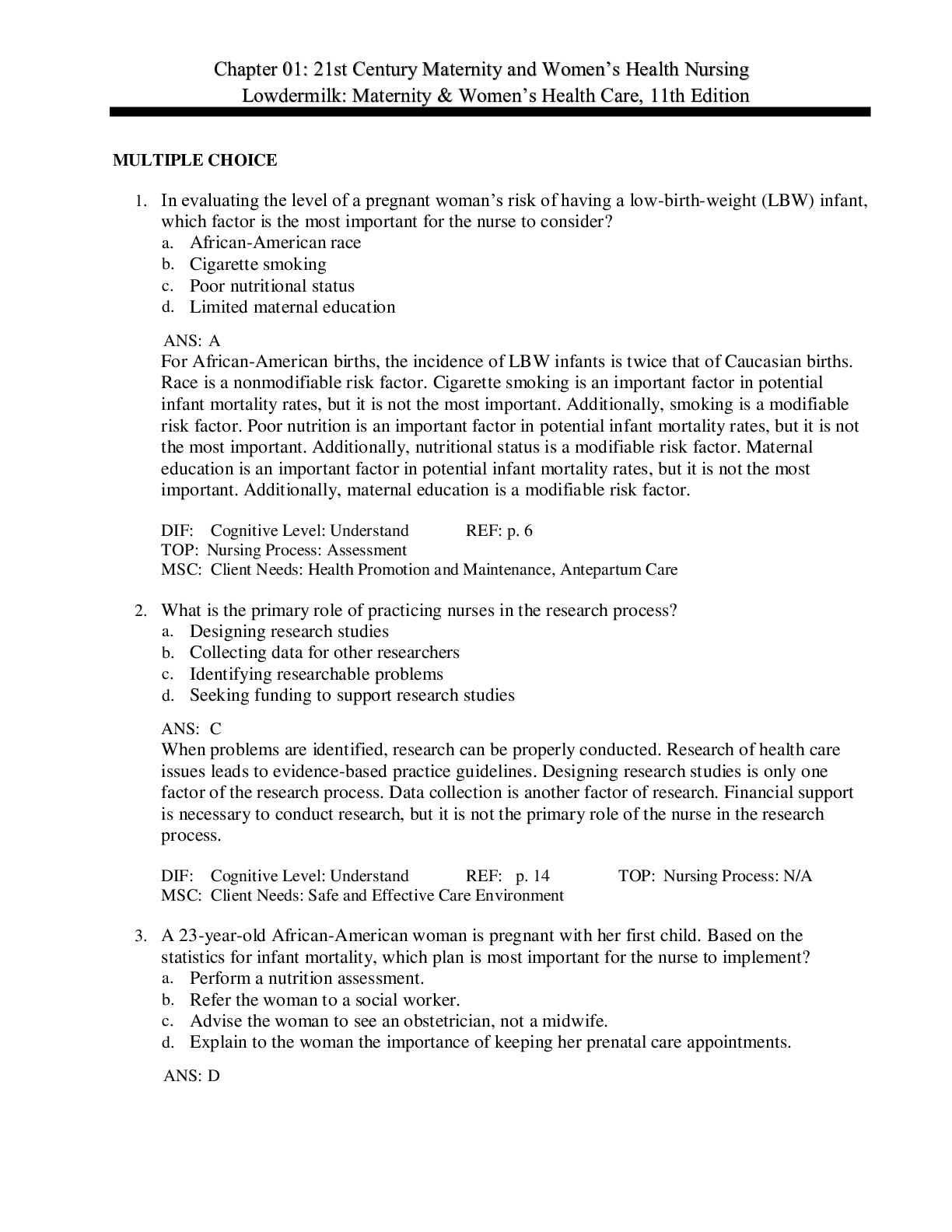
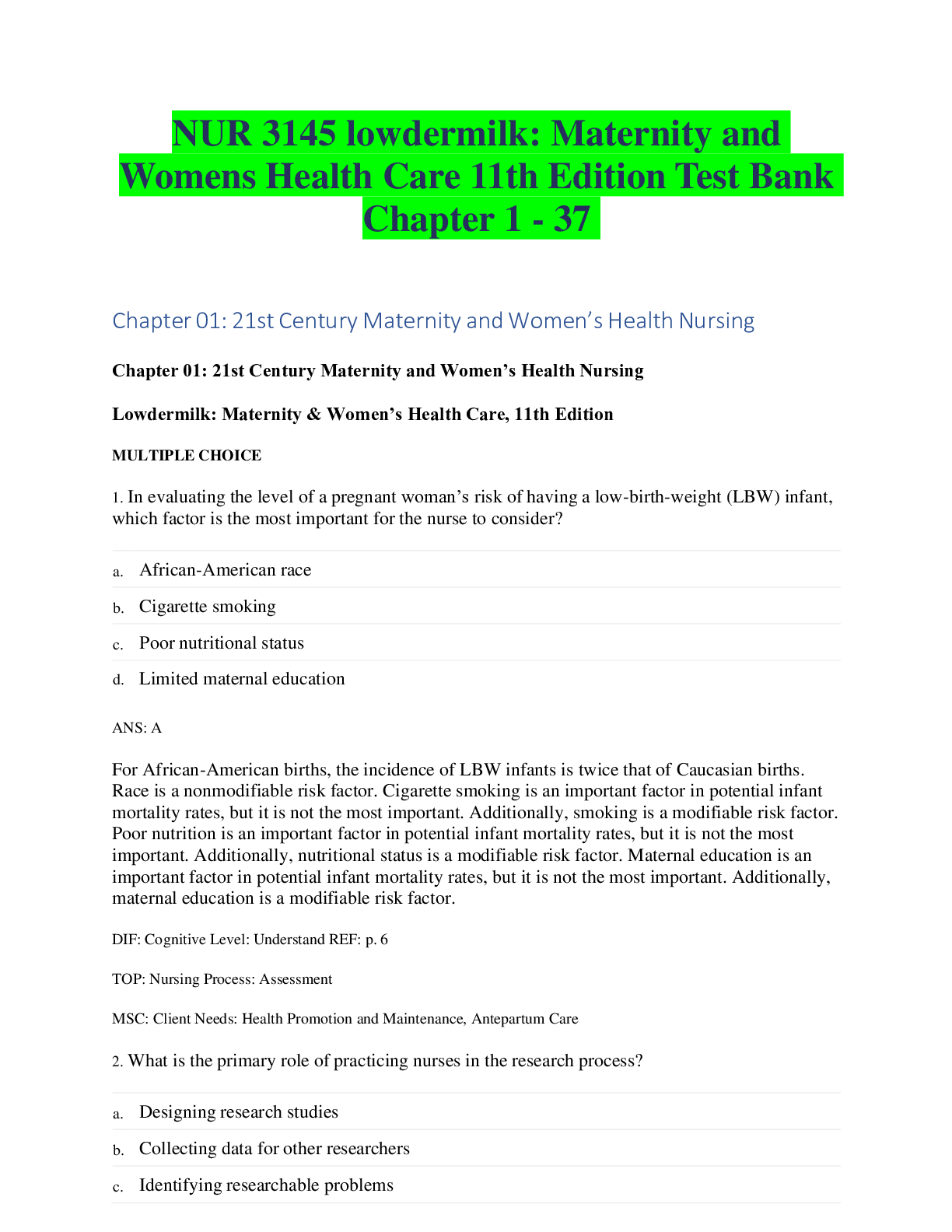
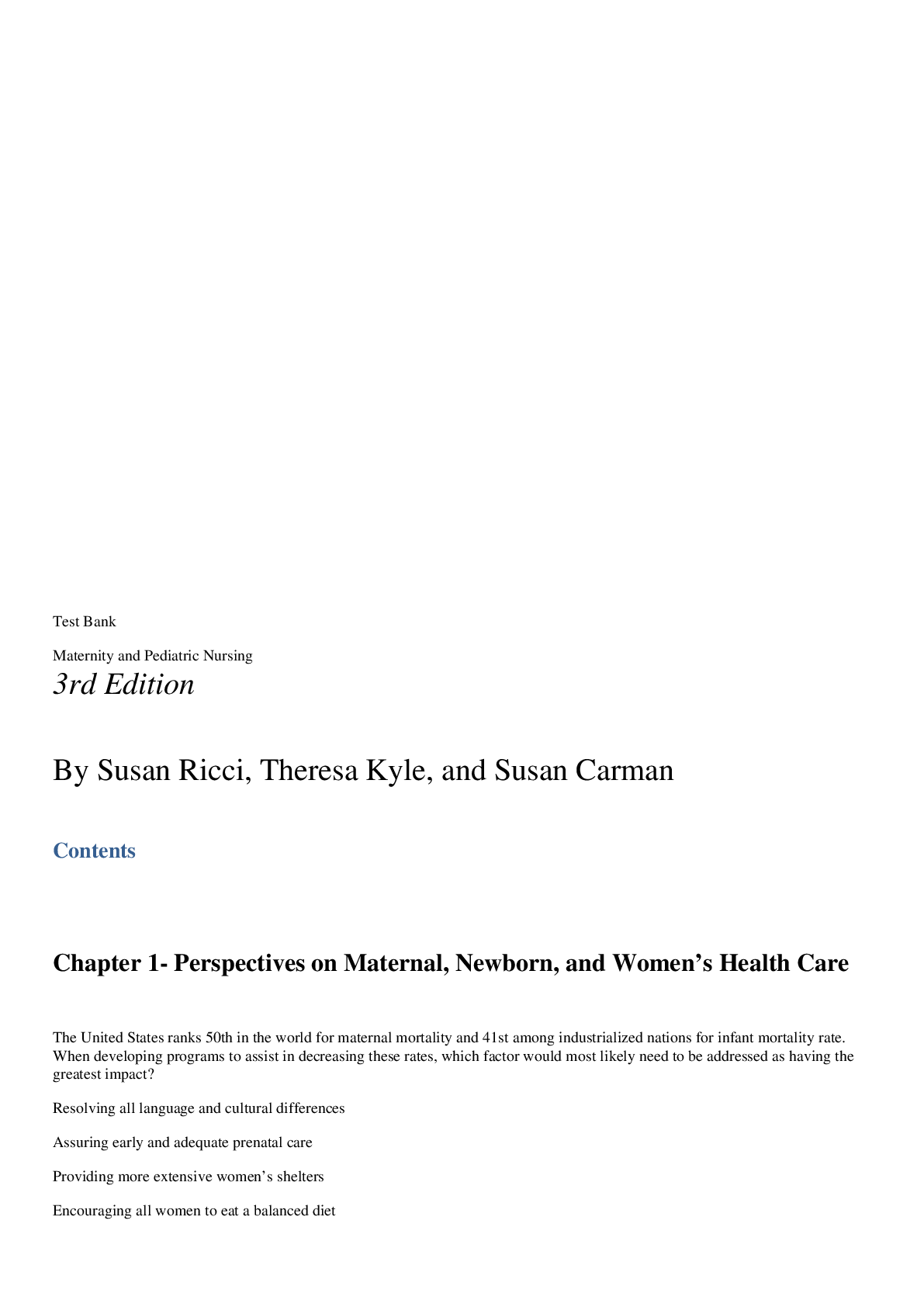
.png)
, All Correct, Download to Score A.png)
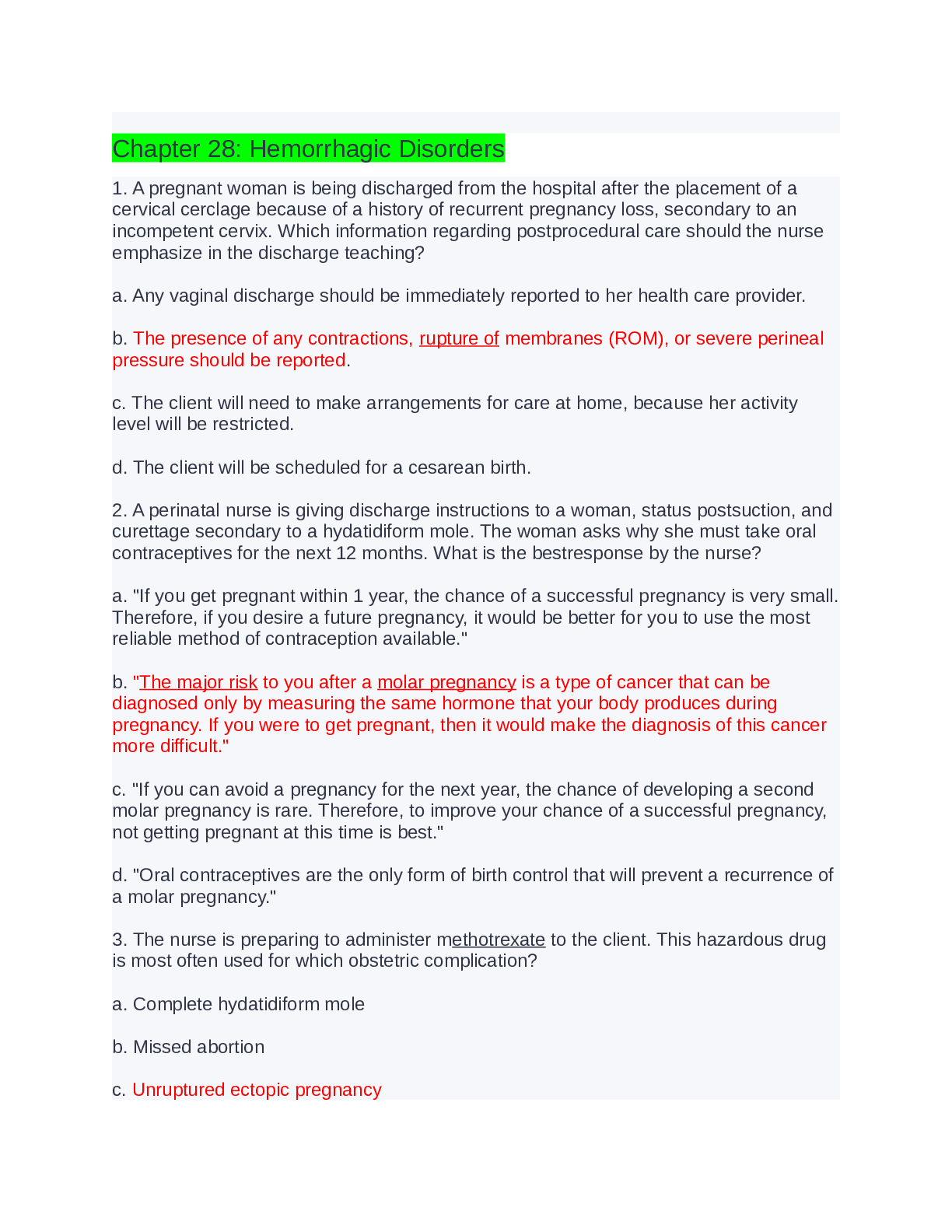
 Correct Study Guide, Download to Score A.png)
, Correct, Download to Score A.png)
.png)
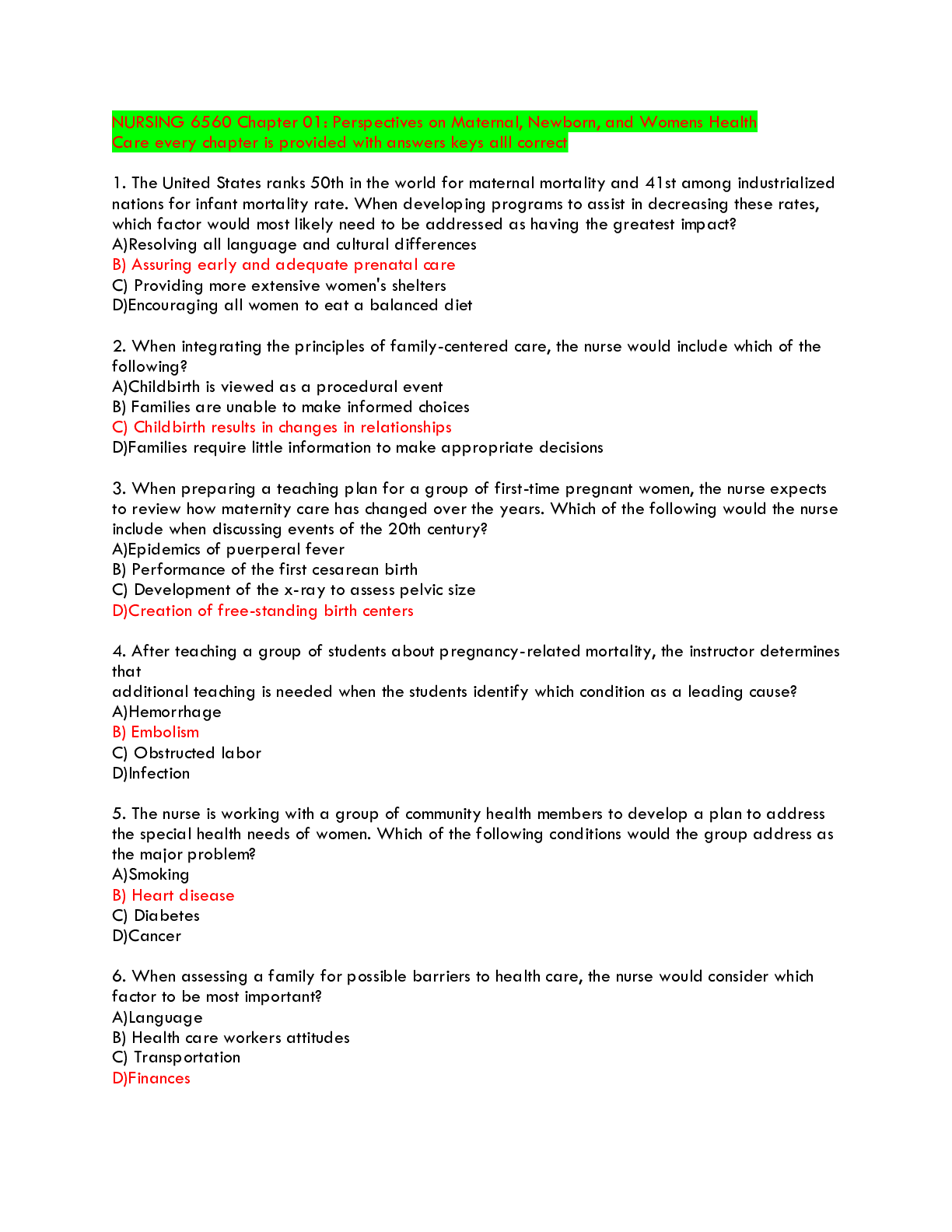
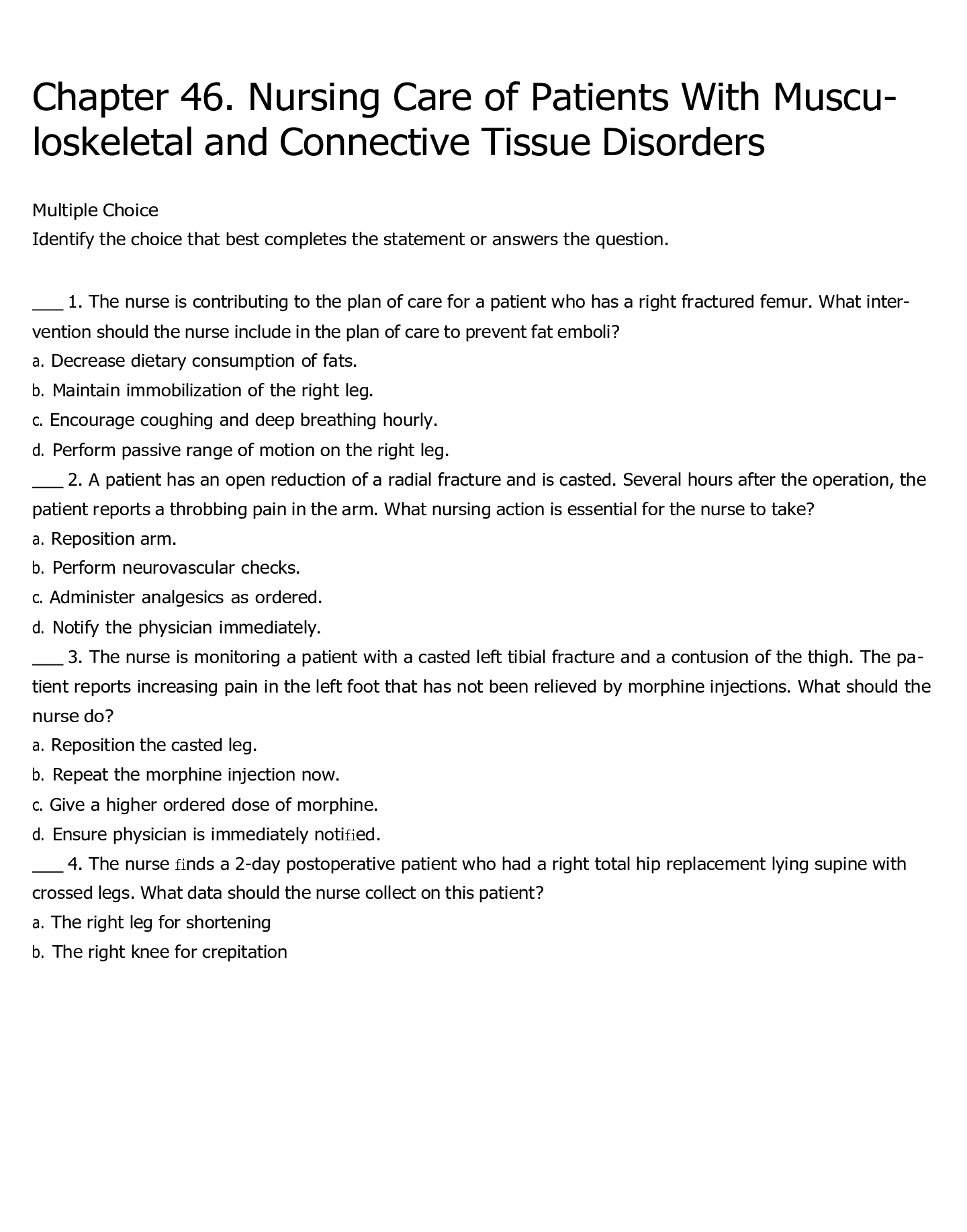
, 100% Correct, Download to Score A.png)
